Table of Contents
- About this book
- Who is Suwilotichi ‘Su’ Simwanza?
- Who is Annalinde Singh?
- Who is Bevan Williams?
- Who is Nkululeko Masondo?
- Who is Qaqamba Nono Donsa?
- Who is Socotra Williams?
- Who is Mkhulu Christopher Rathebe (Chris)?
- Who is Khwezi Mputa?
- Who is Nilesh Makan?
- Who is Maritza van den Heuvel?
- Who is Aslam Khan?
- Who is Samantha Laing?
- Who is Karen Greaves?
- Who is Annu Augustine?
- Who is Cara Turner?
- Who is Carlo Kruger?
- Who is Kevin Trethewey?
- Who is Rian van der Merwe?
- Who is Mike Freislich?
- Who is Mark Pearl?
- Who is Peter Hundermark?
- Who is Joanne Perold?
- Who is Martin Cronje?
- Who is Cliff Hazell?
- Who is Kevin Shine?
- Who is Justin Doyle?
- Who is Austin Fagan?
- Who is Dillon Weyer?
- Who is Pavel Dabrytski?
- Who is Biase De Gregorio?
- Who is Regina Martins?
- Who is Jacques de Vos?
- Who is Mark Nilsen?
- Who is Antoinette Coetzee?
- How we connect
- Who is agile series
- What are we reading?
- How many times has this book been published?
About this book
Greetings in all 11 official South African Languages: Sanibonani (isiZulu); Molo (isiXhosa); Hallo (Afrikaans); Thobela (Sepedi); Dumela (Setswana); Lumela (Sesotho); Abusheni (Xitsonga); Sanibona (SiSwati); Avuwani (Tshivenda); Salibonani (isiNdebele); and Hello (English)
This book is based on the original Who is Agile? In South Africa book which was published in 2016. This version has been adapted to highlight a view of Who is Agile in South Africa that is more representative of our country’s diverse demographics.
We are at a pivotal time in history, where, as a society, we need to make a concerted effort to create a more diverse and tolerant society. We need to redress the imbalances of the past, not only from a global perspective, as is evident from the “Black Lives Matter” movement, but importantly, from a South African perspective. We must do this, not only because it is the right thing to do, but also because it is explicit in the preamble of our constitution:
We, the people of South Africa, Recognise the injustices of our past; Honour those who suffered for justice and freedom in our land; Respect those who have worked to build and develop our country; and Believe that South Africa belongs to all who live in it, united in our diversity.
We therefore, through our freely elected representatives, adopt this Constitution as the supreme law of the Republic so as to: Heal the divisions of the past and establish a society based on democratic values, social justice and fundamental human rights; Lay the foundations for a democratic and open society in which government is based on the will of the people and every citizen is equally protected by law; Improve the quality of life of all citizens and free the potential of each person; and Build a united and democratic South Africa able to take its rightful place as a sovereign state in the family of nations.
May God protect our people.
Nkosi Sikelel’ iAfrika. Morena boloka setjhaba sa heso. God seën Suid-Afrika. God bless South Africa. Mudzimu fhatutshedza Afurika. Hosi katekisa Afrika.
The idea for the book evolved after numerous conversations around racial inequity in the SA Agile Industry. To ensure alignment with what we wanted to achieve, a brainstorming session was held, and a vision was set out to build a more transformed community of practitioners, where “Race is no longer a concern in the Agile industry” and where everyone, regardless of race, gender, sexuality or social class feels welcome, supported, heard and included in the agile community.
It was recognised that, while the original book features some of the most impressive minds in the industry, however, the book, being a “South African” version, was not representative of the demographics of the country.
This iteration of the book will strive for more inclusion but will remain a community effort which aims to highlight bright minds, both new and old, who are striving to create better businesses, more engaged teams, improving value delivery, and making work more enjoyable; where people come to work not because they have to, but instead because they want to make a difference through more purposeful businesses.
It is said that South Africa is “Alive with Possibilities”. This great nation has an incredibly rich heritage filled with difficult times and times of greatness. As a nation, we have had our share of challenges but through sheer will and determination, we repeatedly rise to fight the good fight.
South Africa has some of the most scenic places on earth, such as Table Mountain, which has proudly been included in as one of the official new 7 natural wonders of the world. There is also the Kruger National Park, which is one of the largest game reserves in Africa, covering just under 20,000 square kilometres (7,500 sq/miles) and housing the most iconic wildlife, including the Big Five, that include the Lion, Leopard, Rhinoceros, Elephant and the Cape Buffalo.
South Africa also has some of the most delicious food in the world. This may be attributed to the spice route in the 15th to 17th centuries, where European countries such as Portugal and Spain were transporting spice from India by ship. The trip had to circumnavigate Africa and rounded the Cape of Good Hope (Cape Town), where some of the spices were traded for precious metals such as Gold. This has influenced South African cuisine, which is rich with flavour and aromas. To pair all the delicious food, South Africa also has some of the most stunning wines in the world. Given our fertile South African soil, we created our unique varietal of wine, the Pinotage, which is a cross between a Pinot Noir and Cinsault and is an earthy yet deliciously dark fruity wine.
Besides the natural beauty, South Africans love adventure and South Africa is home to interesting extreme activities such as one of the Gold Reef City Roller Coasters, the Tower of Terror, which is ranked 1st in the world in terms of the highest number of G-forces the ride pulls on your body (6.3G) as well the Bloukrans Bungee Bridge, which is the highest commercial bungee jump, at 216 meters (709 ft).
Most importantly, South Africa has some of the smartest, warmest and friendliest people across the globe. Some of whom we will showcase in this book.
A key ethos of this book is that it is written by the community, for the community.
All proceeds from the sale of this book will go towards improving transformation within the South African Agile community.
Who is Suwilotichi ‘Su’ Simwanza?
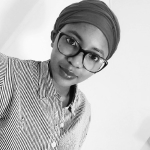
What is something people usually don’t know about you but has influenced you in who you are?
I am an introvert. Nerdy, enjoy solitary activities, love super hero movies (although I am picky) and love reading a good fantasy-action-romance novel (Ilona Andrews is my favorite).
What would have become of you, if you were not doing the job you do today?
I would probably be working on becoming a full time lecturer and the University of Johannesburg. I completed my Masters for that specific purpose.
What is your biggest challenge and why is it a good thing for you?
My biggest challenge that I am hardest on myself. Its good in that it keeps me humble however it is a double edged sword as requires a bit more effort to see the good over the bad.
What do you currently do and how did you end up in your current role?
Scrum master.
I got introduced to agile 6 years ago when the company i was working for decided to ‘go agile’. I met my first agile coach, Reneshan through that who guided me in my first year on a scrum team. Later on, the company stopped taking on agile projects which meant I could not be a scrum master anymore. I stayed for 2 more years before deciding to restart my career as an intern in order to reach my goals. I applied for the DVT Scrum Master Apprenticeship Program and met Carlize Bosch through it. She provided me with the opportunity to grow and expand my skills as a Scrum Master.
She introduced me to my second Agile Coach Justin and it is through through them that I ended up up at Discovery.
What do you think is the one thing we can do to improve diversity in the Agile community?
Be Less Judgmental, Make No Assumptions and Cultivate Inner Peace. I find that even as agile practitioners we find ourselves at war discussing which framework is better, which approach to a framwork is better and which frameowk sucks. In my mind, it seems like we are so rigid about it which is in direct opposition to the ‘agile mindset’ that we all profess to have.
What additional question do you think we should ask and what is the answer to that question?
What is one regret you have in your agile career? Not focsuing on the small wins and spending too much time worrying about what is not working. This held me back from seeing th progress that was made by my teams.
Who do you think we should feature next (in South Africa)?
Basane Hlabyago (https://www.linkedin.com/in/basane-ringane-hlabyago-9a466527/)
What are some reasons that made you recommend the person above?
We both gave our first talks at the SUGSA meetup on the same day. I remember listening to her experiencing and relating to the challenge that we as have to listen more to our teams and the environments that we are charged with coaching.
How would you define your relationship with the South African Agile community?
Growing every day. I would not have been where I am today if it was not for the support, encouragement and learning that I have recieved from this agile community. It is one of the reasons why I signed up to be part of the SUGSA committee. I wanted to do my part to give back and grow the community. I also want to bring the community closer to students who are still completing their studies.
What is the last thing you read, watched or listened to that inspired you?
I am a sucker for korean and chinese dramas. Anything you watch there will have a life lesson or 2 to take with you. One of them being even a villian can be redeemed given the chance.
Johannesburg, September 2020
How to connect with Suwilotichi
Linked In: za.linkedin.com/in/suwilo-simwanza-43a7121b
Who is Annalinde Singh?
What is something people usually don’t know about you but has influenced you in who you are?
My career has come through a variety of industries and roles, including restaurants, music, retail, insurance, call centres, mining, supply chain, banking, non-profit, and consulting. I get my energy from range in my activities, so this variety truly is the spice of my life. The people and roles I’ve gained exposure to over the years gave me a deeper level of empathy for humans, and a breadth of life experience (perhaps beyond my years). These have both served me well.
What would have become of you, if you were not doing the job you do today?
I would probably be a Rapid Results Facilitator working alongside one of my previous mentors, Alrien van der Walt, the person who kickstarted my exploration into the world of facilitation. There could easily be parallels drawn between the work we did and the Scrum Master role, we just didn’t know about “this agile thing” and the industry-specific jargon. Rapid Results is a methodology widely used for non-profit work. I enjoyed it as I could sharpen my facilitation skills while experiencing large variety in the people we worked with and the types of (not-software-related) problems they were solving. This is where I first specifically saw and felt the immense value of a multi-disciplinary group of people coming together in a room to solve serious and costly problems.
What is your biggest challenge and why is it a good thing for you?
I can be impatient. I have learnt to be more aware of it over the years and become more comfortable with allowing people space and time to think and do things without me hovering over them. I’m at home in an agile environment as the frequent feedback loops help me regularly gain new information and experience progress – this supports my journey to a more patient self.
What do you currently do and how did you end up in your current role?
I am an Agile consultant at IQbusiness. I absolutely adore the people in the Agility team, and I’ve experienced major growth through the different people and products I’ve worked with in the last 5 years. My days are filled with some exceptional people, facilitation, talking, listening, coaching, training, doodling, bouncing ideas around with others, and an astounding number of GIFs and emojis. I came to IQbusiness from the mining industry (Supply Chain and Technical) with a brief stopover at a software development start-up. It was an odd situation; one day we were essentially told to pack up and not come back. They closed up shop and started operating 5km away from the old office like nothing had happened. This was one of the strangest situations I’ve been in!
What is the last thing you read, watched or listened to that inspired you?
I don’t know if this can be classified as inspiration: I’m only a bit late to the party and have only recently started watching the almost-sickeningly cheesy musical series Glee. The never-ending supply of teenage drama mixed with well-timed and beautifully harmonic vocal pieces have helped me re-energise especially on tough lockdown days. On a more serious note, recently I attended, “People, people! What do you see? Reflection Journey”, a session expertly facilitated by April Jefferson and Mark Kilby. They lightly and kindly held a space where I could admit certain things to myself that have been slowing down my progress in sculpting some new productive mental health habits. That session has stayed with me, vividly, crossing my thoughts daily. Through it, I have been able to start some positive (and tiny, and sustainable) habits, and for that, I will remain extremely grateful.
What do you think is the one thing we can do to improve diversity in the Agile community?
Those of us with a head-start in our education and career need to go out of our way actively to find, reach out to, help, mentor, include, support, make space for, acknowledge, and amplify the Persons of Colour around us. These are the acts we will look back on later in our lives as the moments that made a difference, and made life meaningful.
What additional question do you think we should ask and what is the answer to that question?
Tell us about your favourite stationery!
Right now, mine is the fabulous Faber-Castell Multimark 1525 permanent marker, and probably my all-time favourite would be SUPER STICKIES! They really are SUPER – my grid of daily scribbles from March 2020 when I’d just arrived home from Mauritius has been repositioned multiple times and I’m pleased to report that not a single drop of unicorn vomit has been seen!
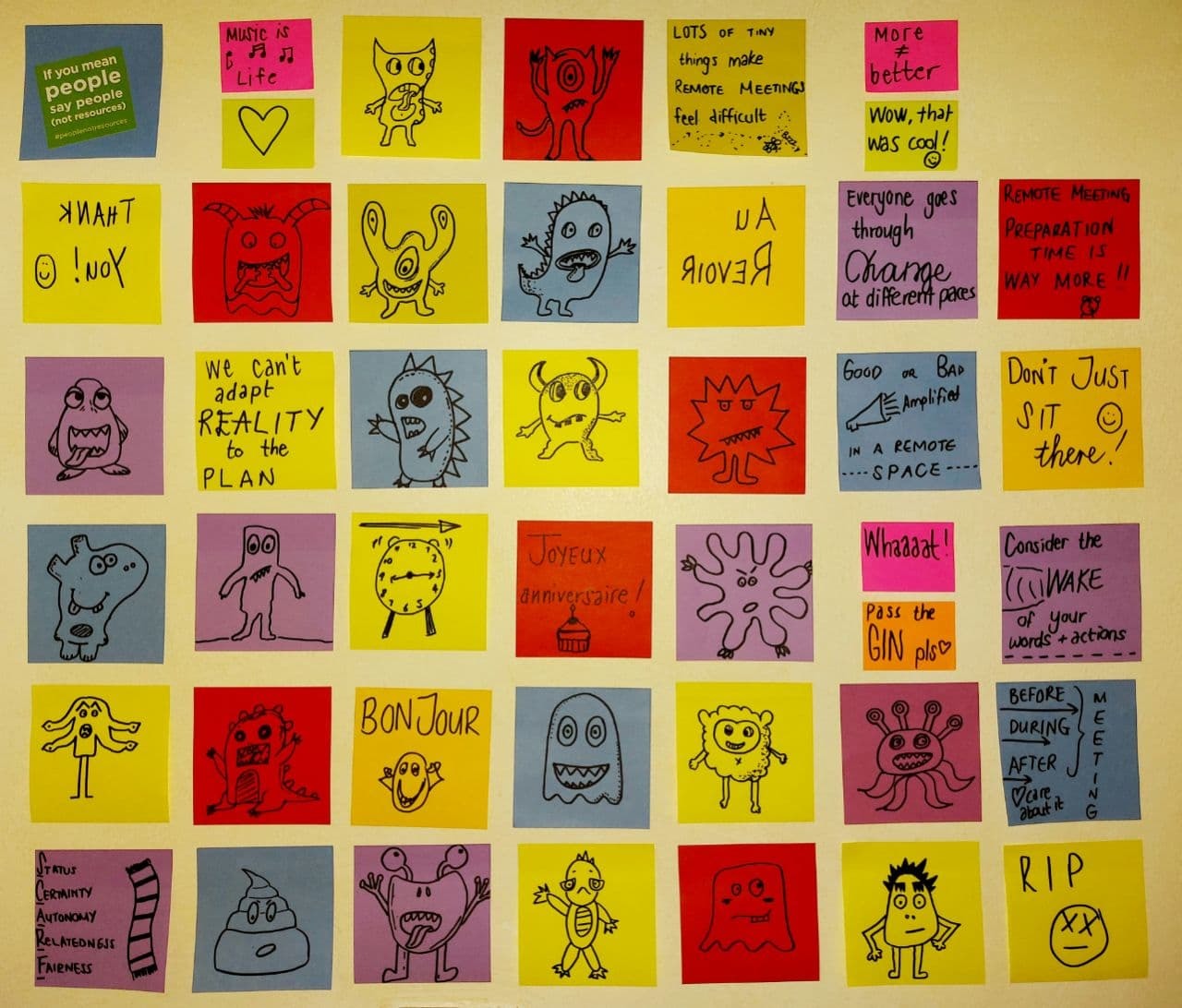
Who do you think we should feature next (in South Africa)?
I’d like to recommend Talia Lancaster (sketchingscrummaste) and Preasan Naidoo as well.
Johannesburg, March 2021
How to connect with Annalinde
Twitter: @aLfriendo Linked In: za.linkedin.com/in/annalindesingh
Who is Bevan Williams?
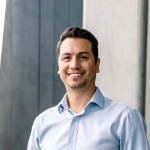
What is something people usually don’t know about you but has influenced you in who you are?
Two things usually surprise people. First, I’m an introvert. I can be loud and charismatic in bursts, but get exceptionally drained afterwards and much prefer being by myself. Second, I’m coloured. It’s not immediately obvious looking at me, so most people don’t know. This has drastically shaped my outlook and experience on race in South Africa. It’s given me a unique perspective on seeing how certain events are perceived by white, and non-white folk alike and has allowed me the opportunity to practice greater empathy.
What would have become of you, if you were not doing the job you do today?
Wow! I can’t imagine not doing what I do right now. My path here had so many potential forks along the way. The most critical one I can recall probably would have had me in a technical lead role.
What is your biggest challenge and why is it a good thing for you?
Getting over feeling like an imposter. It’s great as I’m always motivated to do my best and strive towards greater levels of competency. It keeps me curious and hungry for knowledge and new experiences.
What do you currently do and how did you end up in your current role?
I’m currently an Agile Coach & Trainer by title. I ended up here with a mix of design, luck, and nudges by some role models. I started off as a software engineer working at a small company doing iterative development. I eventually was exposed to Scrum and hated it. My curiosity took over and as I learned more about it, I was determined for our team to realise the benefits. I became Scrum Master, and then the head of an offshore App development team where I went about splitting out my functions in a more Scrum-like way. I realised I liked coaching and mentoring people more than telling them what to do, so made the formal role change to Agile coach.
What do you think is the one thing we can do to improve diversity in the Agile community?
I think we could do more to understand the problem space a bit more. I’d like more space for empathy to exist, where stories and experiences can be shared and truly listened to. We can acknowledge and validate the experiences of others even if we have never experienced something similar to make all feel included and welcome. We should elevate the voices and immense experience of underrepresented groups.
Who do you think we should feature next (in South Africa)?
Ayanda Tshabalala
Johannesburg, September 2020
How to connect with Bevan
Twitter: @bevanwilliams Linked In: za.linkedin.com/in/bevanwilliams
Who is Nkululeko Masondo?
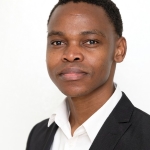
What is something people usually don’t know about you but has influenced you in who you are?
I have been fascinated by computers from a very young age, growing up to learn about most of what needs to happen before it beams up and start taking instructions has influenced me greatly in who I am. From the items that would mostly be in my space, my career choices and the type of content I consume.
What would have become of you, if you were not doing the job you do today?
I definitely would still be doing something around technology. Even if it was for the fun of it.
What is your biggest challenge and why is it a good thing for you?
Balancing out ideals from the realistic journey to reach them. This forces me to think of smaller attainable milestones that do not frighten me to a point where I am not motivated enough.
What do you currently do and how did you end up in your current role?
I am a Scrum Master. I was introduced to different agile ways of working while I was a Management Consultant, this interest me so much that I begin learning more about it, attending meetups and conferences.
What do you think is the one thing we can do to improve diversity in the Agile community?
I think one of the most impactful ways is to ensure representation in public gatherings (conferences, meetups, forums) and this will entice more diverse people to start participating in the community as they feel represented.
What additional question do you think we should ask and what is the answer to that question?
What keeps you going in your agile role? For me, it is the people I am able to touch base with and discuss with them when I encounter something I have not encountered before.
Who do you think we should feature next (in South Africa)?
Ambrose Betiku
What are some reasons that made you recommend the person above?
I met Ambrose a few years back, we have subsequently worked at Nedbank and Absa. We share the same passion, with the distinction that he can exercise more patience and calm is explaining it. Ambrose is also involved in the agile community through meetups and other conversations we have. He also volunteers on the SUGSA committee
How would you define your relationship with the South African Agile community?
I avail myself to people who I can journey with in agile community. This is one of the best thing I found about the community when I started being active back in 2015, that people are generally willing to assist, guide or figure out together what I may not be understanding.
What is the last thing you read, watched or listened to that inspired you?
The Remote Facilitator’s Pocket Guide by Kirsten Clacey & Jay-Allen Morris came just in time and has helped be much during the coronavirus epidemic period when we are all working from home.
Johannesburg, November 2020
How to connect with Nkululeko
Twitter: @masondo Linked In: za.linkedin.com/in/masondo
Who is Qaqamba Nono Donsa?
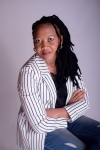
What is something people usually don’t know about you but has influenced you in who you are?
I’m mostly an open book. What you see is what you get.
What would have become of you, if you were not doing the job you do today?
I come from a long family line of educators and I love the process of acquiring new information, so I would probably be learning and imparting knowledge in some shape or form.
What is your biggest challenge and why is it a good thing for you?
We are currently all weathering the COVID storm. So that is a shared challenge.
Part of my survival strategy is to thrive during these trying times and come out on the other side with spunk and strength. This mindset had pushed me to prioritise what matters most and invest my energy wisely.
What do you currently do and how did you end up in your current role?
I’m an agile coach, trainer and life long learner. Ended up here by a combination of hard work and pursuing activities I enjoy and a sprinkle of chance.
What do you think is the one thing we can do to improve diversity in the Agile community?
Before we tackle this, we need to ensure we understand what diversity is and why diversity matters. This conversation has been going on for too long with no concrete change.
What additional question do you think we should ask and what is the answer to that question?
What keeps you you going in your agile role
Who do you think we should feature next (in South Africa)?
Khwezi Mputa and Chris Rathebe
What are some reasons that made you recommend the person above?
Both are passionate and very active in the industry. Chris has a sprinkle of dad jokes on him as well
How would you define your relationship with the South African Agile community?
Intertwined
What is the last thing you read, watched or listened to that inspired you?
Watched a Ted Talk by Carla Harris - How to find the person who can help you get ahead at work. Great insights delivered by a powerful woman.
Also enjoyed reading “Betting on a Darkie : lifting the corporate game by Tata Mteto Nyati” What an authentic man.
Johannesburg, February 2021
How to connect with Nono
Linked In: za.linkedin.com/in/nono-donsa
Who is Socotra Williams?

What is something people usually don’t know about you but has influenced you in who you are?
My travels
What would have become of you, if you were not doing the job you do today?
I would have been a teacher
What is your biggest challenge and why is it a good thing for you?
Being hard on myself - makes me learn about loving myself & in so doing learning to love others more
What do you currently do and how did you end up in your current role?
Agile Coach - following my passion for helping people
What do you think is the one thing we can do to improve diversity in the Agile community?
Intentionally create opportunities & platforms for new & diverse voices. Pair up with someone, mentor someone, each one teach one
What additional question do you think we should ask and what is the answer to that question?
What is something we need to change in the South African Agile community? Especially during Covid?
I would say that we need to be kinder to our humans, not having too many online engagements but still creating spaces for them to feel inspired & learn
Who do you think we should feature next (in South Africa)?
Kirsten Clacey
What are some reasons that made you recommend the person above?
She is an inspirational Agile leader
How would you define your relationship with the South African Agile community?
Engaging & supportive
What is the last thing you read, watched or listened to that inspired you?
Atomic Habits by James Clear
Johannesburg, February 2021
How to connect with Socotra
Linked In: za.linkedin.com/in/socotra-williams-b3960327
Who is Mkhulu Christopher Rathebe (Chris)?
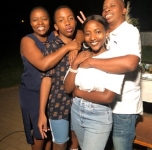
What is something people usually don’t know about you but has influenced you in who you are?
A deep sense of empowering those around me
What would have become of you, if you were not doing the job you do today?
I’d either be a high-school teacher or a sports journalist
What is your biggest challenge and why is it a good thing for you?
Currently (work and personal) surrounded by people who need hand-holding and want to be told to what to do. Good for me in that it “forces the coaching skills out of me”
What do you currently do and how did you end up in your current role?
Coach, Train, Guide and Empower teams and leaders on all things Lean-Agile. Was inspired to transition from software development to process and this naturally led to Process practitioner and now Lean-Agile Coaching
What do you think is the one thing we can do to improve diversity in the Agile community?
Keep spreading the news and articulating the need to diverse people
What additional question do you think we should ask and what is the answer to that question?
What I wished I learnt earlier in my journey… The power of pivoting and experimentation
Who do you think we should feature next (in South Africa)?
Stuart Mann
What are some reasons that made you recommend the person above?
A passionate trainer, speaker and professional; Inspires through everyday-life analogies; Works tirelessly and speaks truth to power in a diplomatic way
How would you define your relationship with the South African Agile community?
Growing at the moment. Potential to be mutually beneficial - I need to “come out of my shell”
What is the last thing you read, watched or listened to that inspired you?
40 Days of Prayer by Kit Cummings and an anecdote about choosing friends and self-confidence
Johannesburg, February 2021
How to connect with Chris
FB, Instagram (Chris Rathebe) Email (chrisrathebe1@gmail.com) Twitter: @mkhulur Linked In: za.linkedin.com/in/chris-rathebe-03447171
Who is Khwezi Mputa?
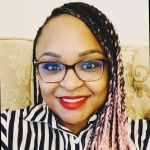
What is something people usually don’t know about you but has influenced you in who you are?
Living in one of South Africa’s notorious townships and attending an affluent school in the suburbs meant I grew up in 2 different worlds and has been the most contributing aspect of who I am today. The experience has made me humble and taught me how to have empathy for others and understand the extremities of human nature when pushed against the odds. I saw first-hand what squandered opportunity looked like and this grew in me the seed to always seize the day and make the most of every opportunity given. It has also taught me how to adapt to different situations and relate to people of all colours and creeds. I am actually a better person because of it and I am grateful for my experience.
What would have become of you, if you were not doing the job you do today?
I would probably be a high school teacher.
What is your biggest challenge and why is it a good thing for you?
My husband travels a lot and so the parenting of our two daughters is mostly on me, add a full time career, my personal interest and this equates to my biggest challenge work-life balance. Although challenging, this has taught me to be more intentional about how I utilise my time and to be present entirely in that moment as I know that time is of the essence.
What do you currently do and how did you end up in your current role?
Many organizations confuse the role of the Scrum Master with a Project Manager and this was one of my biggest challenges in the work place. By nature these are conflicting roles as Scrum Masters have the role of mentoring, teaching, coaching and facilitating, while the role of the Project Manager is to ensure that the project runs to time and budget. Depending on your passion one will always lag and in my case it was Project Management. There were times were I felt my opinion as a Scrum Master was ignored in order to push deadlines and delivery. I felt the work of a Scrum Master was undermined and not valued and as this was my passion it left me feeling empty and miserable. This forced me to find other way of growth and fulfilment through courses and involvement in the Agile community, this kept the spark alive and is what led me to the path of being an Agile Coach.
What do you think is the one thing we can do to improve diversity in the Agile community?
By coming together with other diverse voices and collaboratively drive initiatives that focus on improving diversity in the Agile community.
What additional question do you think we should ask and what is the answer to that question?
Question: If you were an animal which one would you be? Answer: They say an elephant never forgets and that is definitely also a part who I am.
Who do you think we should feature next (in South Africa)?
There are so many but if I had to narrow it to one person it would be Stephan Swart.
What are some reasons that made you recommend the person above?
If I think of who is agile – he is one of the first names that come to mind, he truly is the epitome of what an agilest should be.
How would you define your relationship with the South African Agile community?
It’s growing continuously and I certainly would like to contribute more to it.
What is the last thing you read, watched or listened to that inspired you?
Untamed by Glennon Doyle. This book has certainly inspired me in many ways but most importantly it has taught me that being yourself is freeing.
Johannesburg, February 2021
How to connect with Khwezi
Linked In: za.linkedin.com/in/Khwezi-Mputa
Who is Nilesh Makan?
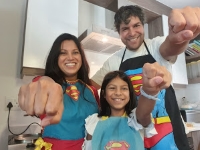
What is something people usually don’t know about you but has influenced you in who you are?
I am a bastard. No, really, I was an illegitimate child, born out of wedlock. Not only was I illegitimate, but I was also illegal - born during apartheid South Africa as a mixed-race child. My father, Naresh Makan, was a second-generation South African Indian, and my mother, Treasure Kirkwood, was white, descended from English, Irish and Scottish heritage. Both my parents were young hippies with long hair and bellbottoms who loved each other. However, the Immorality Act, which was in place at the time, prohibited any relationship between white people and people of different races.
My mother’s parents were insistent that she was not to have a coloured child and sent her to Zimbabwe (Rhodesia at the time) to give birth to me. Given that it was apartheid, my mother was worried that my skin colour might have been too dark when I was born. This may have resulted in the government taking me away from her, so she did as her parents wished. She ended up in a home for women, and my grandfather planned for her to give up her child for adoption. Fortunately, my father’s family in Zimbabwe were ready to “adopt” me if the need arose.
Nicholas Kirkwood (my English name given to me at birth by my mother) was born in Bulawayo Hospital. I was taken away from my mother immediately. After several days, the welfare nurses who had come to know my mother’s story took pity, and I was reunited with her. Somehow my mother managed to get a flight back into South Africa, stating that the father of the newborn child was a South African. After arriving back, my family had an Indian naming ceremony, and I was named Nilesh Makan. In the Indian community, I was known as Nilesh, and everywhere else, I was known as Nicholas. A few years later, my sister was born.
When I was around seven years old, things were difficult; spurred on by my parents’ lives, they decided to separate. My father insisted that my sister and I stay with him, as this was the safest option, and he had a more supportive family structure that would help to look after us.
I grew up in an Indian household in Fordsburg, an Indian area, as per the Group Areas Act. I went to a Catholic school which at the time accepted children of different races. Interestingly, the closest convent school to our home was McAuley House Convent School, an all-girls school. Boys were, however, allowed up to Grade 1. The rest of my schooling life was tumultuous, but I eventually got into a tertiary education institute.
It was soon after that I met my future wife, who is also Indian. Shortly before we got married, I decided to officially change my name to Nilesh Makan, not only because it was the name given to me at birth by my father but also, I didn’t think that Anupa Kirkwood sounded right. It turned out to be irrelevant since she was a doctor, and for professional reasons, decided to keep her maiden surname.
As you can imagine, my upbringing has had a significant influence on my life. It has shaped my values around diversity, family and community. It has made me emotionally stronger and more tolerant of people that are different to me. It had also given me gratitude for the many people who fought the system so that I could be with those who loved and cared for me the most.
What would have become of you, if you were not doing the job you do today?
I love what I do, I find it extremely exciting and rewarding. The people I work with and interact with are all trying to create a better society. I can’t imagine doing anything different today. Having said that, what I do today, may not be what I do in the future, I think as the world evolves, so must we.
What is your biggest challenge and why is it a good thing for you?
I think my biggest challenge is that I have a wide variety of interests. I struggle to balance my time and sometimes battle with direction. The world is diverse and fascinating. There is so much to know, to learn and understand, but this does make prioritisation more challenging.
At the same time, having a broad range of interests allows me to be curious about the world, to ask critical questions and to be able to see things from different perspectives.
What do you currently do and how did you end up in your current role?
I am an independent consultant at a company I founded, Padawan Consulting. I consult mainly around Agile, Strategic Innovation and Digital Transformation. My journey to this point has taken me along many different career paths. I started my career at IBM, where I consulted on Systems Management, Business Process Optimisation as well as Information Security. I then moved to PwC, where I consulted in the arena of IT Strategy and Governance. I subsequently went to work for Sasol, a multinational Petrochemical company, where I held several positions, including heading up Information Security as well as working within the Enterprise Risk Management space. It was there that I got involved with an exciting project to design and define the Digital Strategy for the company. This was where I was first introduced to Agile. The ideas, concepts and ways of work resonated deeply with me. I was appointed as an Agile/Digital Coach as part of Sasol’s Digital Office, working with a wonderful team of people to help shape Sasol’s Agile transformation journey. I left in 2019 to start Padawan Consulting to share what I have learned and to continue learning from others across all areas that I am passionate about
What do you think is the one thing we can do to improve diversity in the Agile community?
I love the idea of shadowing. I think it’s important for people to observe and see how Agile can help improve team performance, particularly where agile is working well. This allows individuals to “see” and eventually “do” Agile (supported with mentoring and coaching), and thereafter to “teach” by letting others shadow them. I believe that this approach can help broaden diversity within the Agile community.
What additional question do you think we should ask and what is the answer to that question?
What is the last book you read?
I have recently finished reading “The Power of Experiments” by Michael Luca and Max H. Bazerman, which I thoroughly enjoyed. The book touches on behavioural economics, which is an increasingly interesting domain of economics that seeks to understand the psychology of humans when making decisions and using experiments to drive improved decision making.
I have just started reading Edward De Bono, “Serious Creativity”, which I have been meaning to read for a long time. I’m hoping to gain insights into the process of creativity and to learn how we can leverage concepts such as Lateral Thinking, a term coined by De Bono, to boost creativity by breaking ingrained habits, improve ideas, enhance skills, and drive performance.
Who do you think we should feature next (in South Africa)?
Molifi Sehaole, who is currently the Vice President for Information Management Operations at Sasol.
What are some reasons that made you recommend the person above?
Molifi not only introduced me to Agile but trained and coached me in the discipline. Molifi has a wealth of knowledge across a range of topics. He is truly a people-focused person and is always willing to make time to grow individuals, which he does with the utmost dedication and passion.
How would you define your relationship with the South African Agile community?
I do try to get involved where possible. Finding the time can be challenging but at the same time necessary in order to grow the community. I thoroughly enjoy the interactions and am always appreciative of the knowledge, enthusiasm and passion that people bring to the conversation.
Johannesburg, September 2020
How to connect with Nilesh
Website : www.padawanconsulting.com
LinkedIn: @nmakan
Twitter: @padawanconsult
Who is Maritza van den Heuvel?
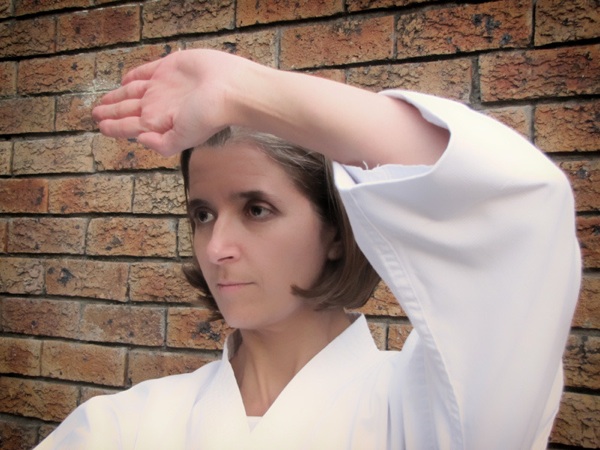
This what Yves Hanoulle had to say about Maritza:
When I started the “Who is” series on my blog, Maritza was among the first people I invited. I did that because I was curious about the woman behind the blog Becoming an Agile Family. It was only when she answered the questions that I learned that she currently is triple-authoring a collection of real-life stories on continuous improvement with Jim Benson and Corey Ladas, among others. I don’t know much more about her, except that she is living in South Africa. (Did you know that Dutch and Afrikaans, are similar?)
What is something people usually don’t know about you but has influenced you in who you are?
With a surname like Van den Heuvel, many people assume that I am Dutch. I am, however, a born and bred South African. My husband’s grandfather emigrated to South Africa in the 1950’s and my husband is therefore a 3rd generation Dutch immigrant. The irony here, however, is that I did live in The Netherlands for a full year when I was just 18. I was a Rotary International exchange student and I spent the year after completing my secondary education repeating a year at a Dutch school in Horn, in Limburg, and living with different Rotary families.
This single year of my life has played a critical defining role in my life. It has set the tone for my future in many ways, from my ability to deal with whatever comes my way right through to my active interest in politics, my thirst for travel and my love of cathedrals and carillon music. To this day, I also bake speculaas during December using a traditional wooden windmill cookie mold. I suspect it even influenced my choice of life partner, ultimately! And yes, I still speak and write Dutch fairly decently.
What would have become of you, if you were not doing the job you do today?
After returning from The Netherlands, I studied Linguistics. I had always had an affinity for languages, one of the reasons Rotary chose me for a European location, rather than an English-speaking country. I firmly planned on becoming a translator, and I did in fact practise as a translator and simultaneous interpreter for a few years before I migrated to the world of software development via technical writing. If I had not moved to IT, I would most likely be working in a language-related field - or writing for a living! I still plan to write my own book (or two) once my current book collaboration project is complete. Better yet - if somebody would pay me (a decent amount!) just to read books all day and review them, I would seriously reconsider my current career path…
What is your biggest challenge and why is it a good thing for you?
My children are both my biggest challenge and the greatest gift life has given me. I think there is no learning experience that molds you quite as much as being a parent. If I were not a parent, I would be a much more selfish and less patient person. And being part of their learning journey - discovering life through their eyes all over - is a tremendous education in itself.
What drives you ?
An unquenchable thirst for knowledge, backed by a compulsion to do anything I do to the best of my abilities. There is also a bit of a restless spirit there - something that drives me to keep moving, never standing still in one place too long, whether that’s a physical place or a pit stop on my career path. As a result, I have migrated through a number of IT disciplines since first becoming a technical writer. I’ve been a tester, managed a Support desk and most recently spent the last few years in product development as a Product Owner and/or Product Manager. If there ever were a poster child for the concept of a Lifelong Learner - that’s probably me. As long as there is some new concept I can wrestle with and turn over in my head or hands, I’m happy.
What is your biggest achievement?
There are many achievements that I’m proud of in my life, both personally and professionally, big and small. But the one that I’m currently most delighted about is achieving my green belt in Shotokan karate this past December. It’s been hard work, physically but especially mentally. Nothing teaches you humility quite like attempting to perfect the subtleties of some of the more challenging kata combinations - especially as a “late starter” in martial arts. Right now, achieving a black belt seems like a remote possibility, but as my sensei recently impressed on me there is nothing that stands in my way of getting there - except possibly myself.
What is the last book you have read?
The Litigators, by John Grisham. Nothing spells holiday to me like racing through a fun read.
What question do you think I should also ask and what is the answer?
How does your family really feel about the fact that you practise your agile and lean techniques on them at home?
My husband sometimes teases me, especially when I get super-excited about seeing a particularly shining example of self-organization emerging in our children as a result of my experiments. But I believe everybody sees and feels the tremendous positive impact these experiments have had on how we share responsibilities at home, and more importantly, on how we communicate with each other, instead of keeping all our ideas, plans and ToDo lists hidden away inside our heads.
Whom do you think I should ask next?
Aslam Khan - he frequently blows my mind with his views on software development and reminds me of how much I still have to learn.
Cape Town, November 2012
How to connect with Maritza
Twitter: @maritzavdh
Linked In: za.linkedin.com/pub/maritza-van-den-heuvel/15/805/605
Who is Aslam Khan?
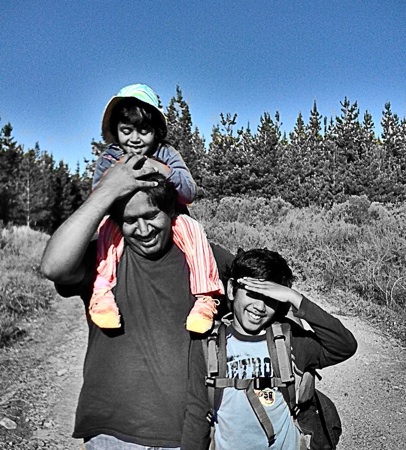
Aslam was proposed by Henrik Kniberg and by Maritza.
This is what Karen Greaves says about Aslam:
Aslam is a developer at heart, but able to speak to senior managers to help them solve their problems. He feels most at home pairing on complex problems and helping others learn techniques to take their coding to the next level. But that’s not what I most enjoy about Aslam. For me (and my business partner Sam) he is our business mentor. He is always willing to listen to your concerns and gives you open feedback, to help you find the right path. He is humble and doesn’t judge. Every discussion with Aslam, leaves me feeling calm, in control and inspired to try something new. Sam and I have come up with nicknames for Aslam. I call him buddha, and she calls him Yoda. If you meet him you will know it’s not because of his pointy green ears. He definitely deserves to be featured in “Who Is agile”.
What is something people usually don’t know about you but has influenced you in who you are?
There are 3 very distinct moments that made me aware of the fragility of life. Strangely, these moments made me realize how small yet significant I am in the big scheme of life.
The first moment was in 1986 when I was in my final year of high school. My older brother was beaten by police and arrested during a political protest against the apartheid government. He remained in detention without trial for 6 or 8 weeks. It was the first time I went through distinct emotional phases of fear, anger, despair and sadness.
In 2000, my wife almost died while being pregnant with my first child. My child was born 2 months premature, spent the first 2 months of his life in an incubator. I recall being told by our doctor that they will save my wife first, then my child. That was surreal, to say the least. Anyway, I became a father, walked into neonatal ICU, peered into an incubator at a 1.2kg human being that looked older than my father. I had no idea what to do, so I went home. It’s insane trying to figure out being a father when you have no opportunity to bond physically.
More recently, my second child suffered a brain hemorrhage at the age of 1 month. She had less than 5% chance of survival. Five days later she awoke and started feeding again. That was scarier than the medical trauma 5 days before. She is now 8 years old, has a terminal liver disease and lives life from a wheel chair. I learnt that “being in control” is an illusion. We can only react to things that happen.
Oh, and what most people don’t know is that I married the girl that I fell in love with in high school, and we have been together for more than half of our lives. If that doesn’t define who I am, then I don’t know what will :-)
What would have become of you, if you were not doing the job you do today?
The obvious candidate would be to be a medical doctor which is the default career in my family. My parents were both doctors and so is my brother and his wife, and there are enough other medics in the extended family to host a conference. But I was quite determined not to be a doctor, so I studied Electronic Engineering. But, my first job was writing software far from transistors and op-amps. So, software development is my alternate career. If I hadn’t done software development, I’ve often thought of going into animation. I think the fluidity of the medium is similar to code - just magical.
What is your biggest challenge and why is it a good thing for you?
Oh no, that’s not a fair question. All challenges are equally big! If it’s not big, it can’t be a challenge, right? Seriously, one of my challenges is trying to be a parent. Oh boy! Just when you think you’ve figured it out, you find something unexpected that humbles you. It’s the mirror of my life with no photoshop effects. Consequently, the challenge I give myself is to understand myself, my behavior and my feelings. A lot of Why did I do that? is asked frequently within me. Right now, for all the questions, in all those contexts, there are a few things that are gaining some clarity. I hope that this clarity changes my behavior so that I am a better person. Ahhh, so that’s my biggest challenge. I take back “all challenges are equally big” :-)
What drives you ?
The notion of something being impossible excites me. Nothing should be impossible. In a pure scientific sense there are things that are not possible, but from a practical sense, even impossibilities can be converted into something that is practically useful, even if it is not ideal. I love the promise of simplification. I guess what ultimately drives me is that I know that it is just a matter of time when the simpler option will emerge. The trick is being patient, that’s a slow feedback loop. So, being patient drives me.
What is your biggest achievement?
I don’t like to rank achievements. I think all achievements should be celebrated equally. I have learnt that even “small” achievements caused big changes in the journey of my life. The frustrating aspect is that I seem to have very little control over the feedback loop from achievement to realization of value. For example, understanding pointers, and pointers to pointers in C resulted in a decade of elegant problem solving, and not to mention the deep appreciation of a garbage collector. Or perhaps that I do understand that multiplication is short-hand for addition and decades later, I can try to find creative ways to help my daughter understand such crazy, abstract concepts as increasing in discrete and exact quantities.
What is the last book you have read?
Fred Brooks’ Mythical Month Essays (again). And also Haruki Murakami’s 1Q84. Last night, I finished reading Roald Dahl’s Danny, Champion of the World with my daughter. That’s the best father/child book ever (read it with my son too). At the moment I am reading Isaac Asimov’s The Gods Themselves - sci-fi/fantasy is like mental detox material for me.
What question do you think I should also ask and what is the answer?
If you had a chance to do a heavenly trade-in of Justin Bieber, for whom would you trade him?
Bob Marley ‘cos we still need to drive them crazy bald heads out of town.
Whom do you think I should ask next?
Samantha Laing and Karen Greaves of Growing Agile. I have seen them convert their own scary ideas into reality, taking leaps of faith, tripping and getting up - and smiling most of the time. Just insist that they steer clear of that agile games thing ;-)
Cape Town, November 2012
How to connect with Aslam
Twitter: @aslamkhn
Linked In: za.linkedin.com/in/aslamkhn
Who is Samantha Laing?

Sam was proposed by Aslam Khan.
Here is what Karen has to say about Sam:
I met Sam when I interviewed her for a ScrumMaster position. I walked straight out of the room and made the offer. I knew she “got” agile. A few years later we started a business together. I love the fact that she gives me constant feedback on things she observes, and I know it is always intended to help me improve.
What is something people usually don’t know about you but has influenced you in who you are?
I’m a dog person. I have 3 dogs and 1 cat. The dogs remind me to always forgive quickly (5 minutes!) and then be wagging my tail again. And should I forget - my wife reminds me to wag my tag.
On a more serious, vulnerable note. I worry. A lot. About everything. I’m a control freak by nature. Especially around time. I need to be 5 minutes early to everything - otherwise I feel like a total failure. Karen and my wife tease me about it all the time. I’m getting better … I think … :)
Oh, and in case you missed the above references - I’m gay and happily married to a woman. While I don’t hide this, some people are really suprised when they realise it - so perhaps less people are aware than I think.
What would have become of you, if you were not doing the job you do today?
Sjoe! Its hard to think about not doing the job I’m doing now. I think I would probably have become a Software Dev Manager at a little company somewhere. Or a school teacher.
What is your biggest challenge and why is it a good thing for you?
My fitness level and smoking. Both are with me sporadically. I work hard on both - in spurts. Its a continuous give and take that hopefully oneday will find calm and balance.
What drives you?
My curiosity. I always wonder if there is a better way, an easier way, a more fun way. I don’t believe life needs to be difficult - its us that makes it difficult. (Well, us and computers).
What is your biggest achievement?
Thus far its having “BeBrave” as a resolution for a year and vowing to always take the path I don’t know. It led me to my job, my wife and so much more!
Is there a piece of music that has a special meaning for you?
Not really. I love breaking into song - just a sentence or two at usually weird times :) I never remember all the words to a song or the artists or anything - I’m really bad with things like that.
What is the last book you have read?
mmm some romance pulp whilst on honeymoon ;) I am currently reading The Peoples Scrum by Tobias Mayer.
What question do you think we should also ask and what is the answer?
My favourite dessert is Tirumisu.
Whom do you think we should ask next in South Africa?
Joanne Perold - a Scrum Master in Johannesburg who amazes me with her insights.
Whom do you think we should ask next, not in South Africa?
Geoff Watts - A Coach and trainer in the UK that has a similar (to me) fun outlook on life.
How would you define your relation to the South African Agile community?
Symbiotic. I strive to give as much as I have received over the last few years. Its the reason Growing Agile started Agile Breakfasts, and things like the agile bookswap. We have such a rich community and we can all learn so much from each other.
Cape Town, April 2013
Mmm not sure I have much of a relationship anymore. I keep in touch with a few people in the community and support them via retweeting things or having zoom chats. Mostly I am trying to create a community in NZ that is as awesome as the SA community. It is a rare and beautiful thing. Covid has brought a deeper connection to the worldwide community as most events are happening online still - so that has been a great way to mix and mingle with people you might only see at large international conferences. I like that the global community has become richer because of this crisis. I wonder how we can keep the excitement and energy of large international community events in an online format whilst supporting and encouraging local in person group events.
New Zealand, October 2020
How to connect with Sam
Twitter: @samlaing
Linked In: za.linkedin.com/in/samlaing
Who is Karen Greaves?
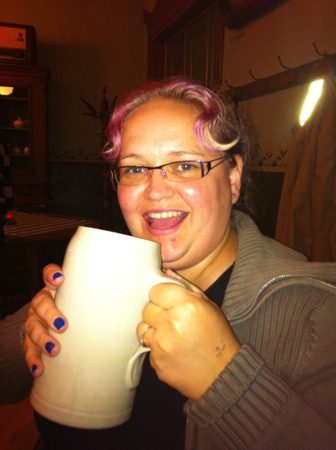
Karen was proposed by Aslam Khan.
Here is what Sam has to say about Karen:
Karen is my business partner and best friend. Neither of us thought that working together would turn out the way it has. Somehow we manage to bring out the best in each other. I don’t think I would be brave enough to do my day job without Karen. She supports me and constantly challenges me to be more and grow more. We share many thoughts, traits and even middle names ;)
What is something people usually don’t know about you but has influenced you in who you are?
One of the most influential things in my life was burning out twice. I am a workaholic and an overachiever, and in the software industry that can often lead to insane hours and stress. It took me 2 attempts and about 5 years to really change who I am, and accept that more than about 35 hours a week leads to crap work, even if you don’t think so at the time.
What would have become of you, if you were not doing the job you do today?
Although I started off studying Astrophysics, I think nowadays I would be an accountant :) People think I’m kidding when I say this, but I love numbers, accounts, budgets, ledgers, investments and anything to do with that. Sam calls me the Financial Director for our company because I love dealing with all that stuff.
What is your biggest challenge and why is it a good thing for you?
Keeping quiet :) I love to talk, and I’m a natural extrovert. However being a good facilitator and coach requires both being comfortable with silence and giving people space to talk. It’s a constant struggle for me not to talk, but every time I do, I learn very valuable things and connect better with people.
What drives you?
When I hear about the impact I had on other people’s lives for the better. e.g. they have stopped working overtime, or started to appreciate others more, that’s confirmation for me of why I do what I do.
What is your biggest achievement?
Following my heart and starting Growing Agile with Sam. It has been a fantastic ride so far, and it’s only just beginning. I think everyone should work for themselves, it’s an amazing discovery about what really motivates you, and what you enjoy doing.
Is there a piece of music that has a special meaning for you?
Not really. I think I’m musically challenged :) I am pretty much tone deaf, and most of the time if music is playing I tune it out. I am one of those people who drives my car without music playing, without even noticing it.
What is the last book you have read?
Lean Thinking by Womack and Jones. It was also one of the best books I have read, kinda life changing and now I think about lean all the time. I see so much waste around us, and we are definitely conditioned into batch and queue thinking, it’s hard to break that.
What question do you think we should also ask and what is the answer?
What are you currently playing (on xbox)?
Just bought Bioshock Infinite, hope to start this weekend!
Whom do you think we should ask next in South Africa?
Otto Behrens and Walther Behrens. I first met them in 2001 when I was working as a developer. They were at Equinox and were the first people I met doing eXtreme Programming. Earlier this year our paths crossed again. They are now at FINworks and still doing agile really well.
Whom do you think we should ask next, not in South Africa?
The two people who have had the biggest impact on me from an agile point of view:
Boris Gloger who made me realize that Scrum was a lot more than the mechanics I perceived it to be and started me on the journey of being an agile coach.
Lyssa Adkins (although I think she’s been featured). She fundamentally changed my view of coaching and management, which has made me a much happier person and a better coach.
How would you define your relation to the South African Agile community?
Starting to let go! I got very involved in the Scrum User Group (SUGSA) the first year it started after my husband roped me in. After that I was on the committee for 4 years, and made it my own. I’m terrible at delegating and so I took on a lot of the work myself. But with help from the rest of the committee I finally let go. This year I left the committee and am excited to see it blossoming on it’s own. Now I see my role as connecting others to the community and starting other community events like Lean Coffee and Agile Breakfast. I have learned so much from the global agile community, and helping create a local community is my way of giving back. I’m proud the South African community is so vibrant and active.
Cape Town, April 2013
“Divorced :) Lol - it was an amicable divorce, and South Africa got full custody of the children :) I moved to New Zealand in 2018 and as a result don’t really have anything to do with the South African agile community anymore. What was interesting when I first moved here was how noticeably different the South African agile community (at least at the time I left) was to the New Zealand community. The SA one is MUCH larger, and more closely knit. If a company was looking to hire a Scrum Master there were 10 people I could easily and confidently recommend. And when I was recruiting Scrum Masters myself I would have recognised most of the applicants from agile meetup or conferences. In New Zealand I found while there is a small community that is like this, most people who work in agile teams, don’t really participate in the community. Mostly Scrum Master is not even a role title here, it’s a part time job someone on the team or a project manager fills. Interestingly Product Owner is a more common role title here than in South Africa, and the Product Management community seems larger than the agile community. In terms of the agile I’ve seen in companies I actually think South Africa is much further ahead than New Zealand in it’s agile adoption journey and I think the strong community is a big part of that. I do miss the community and I especially loved how each year there was a new wave of people who had discovered agile and were looking for growing themselves and learning and how they found their way to the community.”
New Zealand, October 2020
How to connect with Karen
Twitter: @karen_greaves
Linked In: za.linkedin.com/in/karengreaves
Who is Annu Augustine?
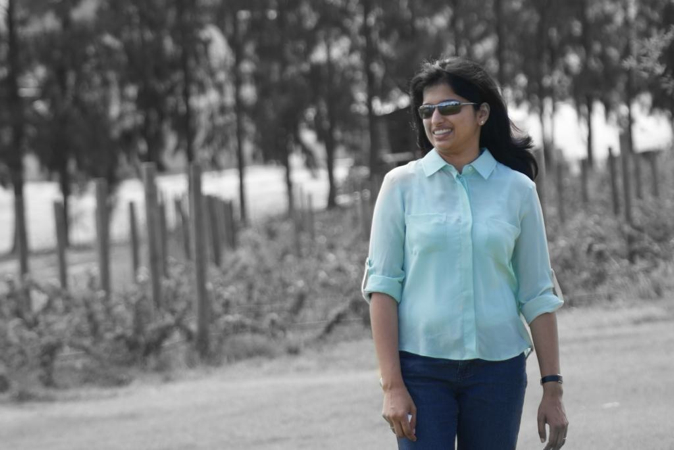
We met in 2002 when we worked together at a small software company. Without realising it we both resigned on the same day to join another company, Workshare. Here we were both introduce to eXtreme Programming. Although we left Workshare a few years later, we have both continued to follow an agile approach. When I worked with Annu she was a developer. However she has now flourished in the Product Management space.
What is something people usually don’t know about you but has influenced you in who you are?
I am an Indian and a catholic, brought up in Africa for the most of my life and completed my higher studies in India. I am kind of a hybrid, and I see myself as an African and Asian, an Afro-Asian, is that possible? I am incredibly passionate about these continents and feel really lucky to have spent significant portions of my life in both. This mixed upbringing has no doubt influenced me.
What would have become of you, if you were not doing the job you do today?
That is a scary thought as I am convinced I have found my passion. So I would have been a frustrated person for sure and a major irritation to those around me :-) I probably would have been bringing some order to something chaotic out there, not sure.
What is your biggest challenge and why is it a good thing for you?
My biggest challenge is that I have way too many things to do, and not enough time, sounds familiar? It is a very good thing for me as I am learning the art of prioritization and learning to say no.
I used to be one of those individuals who used to say yes to everything and got involved in way too many things, overcommitted. Now I have learned to vigorously prioritize and this is good in both my personal and work life.
What drives you?
Working with motivated individuals who really care and are incredibly passionate about the work they do, that is something special, and this helps me push my boundaries as well. One needs to be incredibly lucky to get to work with a team that has just the right mix of individuals, even luckier if you have the privilege of building a team from scratch. I am also someone who is driven by facts and not assumptions, I am always in search of data to prove an assumption, this is very important to me and helps me to make the right decisions.
What is your biggest achievement?
Hmm, interesting one as I don’t often stop to think about these kind of things. It is difficult to point to a specific achievement, but I am incredibly happy about where I am in my professional life. I am a working mother and blessed with two beautiful children. I have managed to balance the demands of being a mother, a wife and lead a professional life. This is something I am incredibly proud of, something I have struggled with in the past and has only been possible because of a very supportive and understanding husband.
Is there a piece of music that has a special meaning for you?
Yes, it is an Indian song, love its beat, enjoyed it since university days. I can listen to it fifty times a day and not get tired of it. My children think I am crazy when I keep listening to it.
What is the last book you have read?
I am busy reading the book ‘The four steps to epiphany’ by Steve Blank, and I am absolutely enjoying it. It highlights about the common mistakes one makes when building a product and it is an eye-opener for me. It has changed my thinking and approach to product development, just can’t wait to apply it now.
What question do you think I should also ask and what is the answer?
What challenges have you experienced in product development?
Product development is really hard, creating a product, getting it out there and creating a sustainable business takes lots of sweat and hard work. I find that way too often there is a serious disconnect between those who are responsible for creating products and those who use the products, the end users. There are various organizational layers between the two groups and this is not ideal. I have also realized that we are very comfortable making assumptions on behalf of end-users, this is dangerous. One needs to connect with the customers and almost ‘crawl into the skin of your customer’; following a customer centric model to product development increases your chance of success.
Whom do you think we should ask next in South Africa?
Cara Turner and Leanne Nel, I know both of them really well and both are very passionate about agile.
Whom do you think we should ask next, not in South Africa?
Tathagat Varma, Sampath Prahalad
How would you define your relation to the South African Agile community?
I have a very close relationship with the community although I miss a lot of the events due to family commitments. I make it a point to stay in touch with everyone, it is a very active and passionate community and I know most of them personally. I have also played an active role in involving some of our members in Agile India conferences.
Cape Town, April 2013
How to connect with Annu
Twitter: @annua
Linked In: za.linkedin.com/in/annuaugustine
Who is Cara Turner?
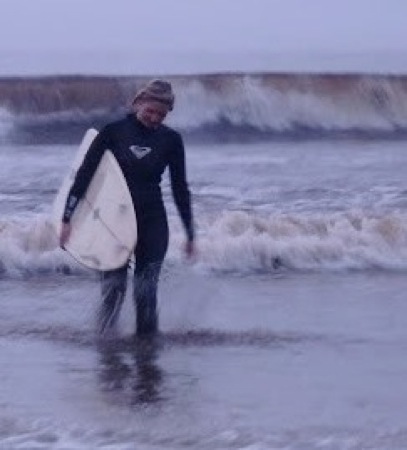
Cara was proposed by Annu. However she was already on this list as she is very active in the local community.
Karen had the following to say:
I can’t exactly remember when I first met Cara, but I do remember the first time she visited me at home. It turns out Cara used to live in my house many years ago! Very weird coincidence! Cara is passionate about facilitation, and she has a soft spot for complexity science too.
What is something people usually don’t know about you but has influenced you in who you are?
I changed schools & university every 2-3 years (5 schools and 2 universities), which taught me a lot about different teaching and learning styles, and how they influence each other. I doubt I’d have been so aware of that if I hadn’t been exposed to such a variety of environments.
What would have become of you, if you were not doing the job you do today?
I studied Fine Art and wanted to become an artist - and later an artist blacksmith. I only left the field because I didn’t have the sales skills needed to earn a living as an blacksmith, and it’s something I see myself going back to in later years.
What is your biggest challenge and why is it a good thing for you?
To limit my own work in progress, and reduce queues. Learning how to prioritize for myself and focus on things I really value is helping me understand product ownership from a whole new perspective.
What drives you?
Boundless curiosity. And a determination to see things done well.
What is your biggest achievement?
With codeX we’re changing IT education in South Africa. We’re applying the project-based approach of agile teams to equip our coders with real world, agile developer skills. It’s really exciting to address both the skills shortage and the digital divide with a high quality offering. I’m also very focused on bringing structured creative thinking into agile teams, to facilitate more breakthrough thinking. It’s a long-term project, with a lot of space to grow.
Is there a piece of music that has a special meaning for you?
This is a hard question! “Imidiwan” by the Tuareg band Tinariwen will always remind me of my first holiday on my own. It’s a reminder to me of how much more we are able to do when we face our fears and overcome them.
What is the last book you have read?
The Universe Versus Alex Woods (Gavin Extence); currently To Sell Is Human (Daniel Pink). Although I must confess I’ve recently discovered audiobooks, so I actually listen to them instead :-)
What question do you think we should also ask and what is the answer?
What’s interesting in agile in Cape Town?
There’s an increasing number of really interesting thinkers, and I think a growing richness in agile knowledge. There seems to be a big focus on doing product ownership and management well, but there’s also everything from complexity to lean to user experience.
There also seems to be a growing number of focused communities - SPIN and SUGSA have been going for a while; RubyFuza, ScaleConf, PyCon and the CodeRetreats over the last couple of years show the growing dev communiities, and now RailsBridge CapeTown. It’s very exciting to be around.
Whom do you think we should ask next in South Africa?
Pavel Dabrytski. And if you have him, Cliff Hazel, Mark Pearl, Mark Nilsen and Annu Augustine
Whom do you think we should ask next not in South Africa?
How would you define your relation to the South African Agile community?
Win/win - the best possible relationship!
I love how much I learn from everyone - it’s a great, diverse community of passionate people with very different perspectives - and I love being able to help create events that make a difference to the community.
Cape Town, April 2013 and updated in Jan 2015
How to connect with Cara
Twitter: @cara_faye
Linked In: za.linkedin.com/in/carafaye
Who is Carlo Kruger?
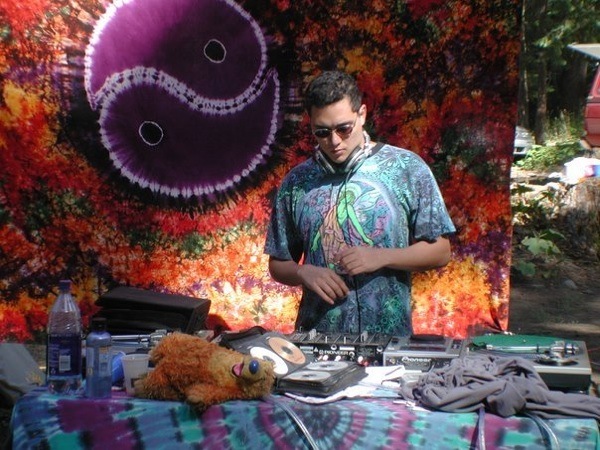
Here is what Sam has to say about Carlo:
I first met Carlo during an interview! Carlo was interviewing me and subtly let me know that the job would not suit me, but that I should meet his wife Karen. A few years later we did meet, and the rest is history. Carlo is a great judge of character.
What is something people usually don’t know about you but has influenced you in who you are?
I took time off to work in a professional kitchen as a cook. It was incredibly hard, poorly paid work but I loved doing it. It taught me some very valuable lessons about trust and teamwork.
What would have become of you, if you were not doing the job you do today?
Hmm - my career “progression” has been a strange one from Risk management to cook to project manager to ScrumMaster to Agile coach. I suspect my next challenge will probably be to become a developer. I like working in the software domain, and it’s hard to imagine doing that now without doing it using some form of Agile or Lean to manage it.
What is your biggest challenge and why is it a good thing for you?
I’m a fairly extreme introvert. This makes it hard for me to meet and interact with people, especially ones I do not know. As a consultant and a manager that has proved to be a significant challenge to remain authentic but also interact freely and openly with others. It has meant that I have become very good at being aware of and managing my energy levels so that I can balance my work and home life and still have space for friends.
What drives you?
I’ve been accused of being a hedonist (which I don’t dispute). So I feel I need to be having fun for an activity to have value. The only counter to this is that I also value loyalty, and when I’ve made a commitment to for example a team I’m leading, I’ll sooner burnout than let them down.
What is your biggest achievement?
Starting my own consulting business during the recent world economic melt down. And surviving long enough on my own to join up with Peter and Marius in ScrumSense.
Is there a piece of music that has a special meaning for you?
Music plays a very important role in my life. I’ve been a singer, guitarist, producer and DJ. The music that is important and which has meaning to me changes slowly over time. The one track which seems to stick however is “Adnan’s” by Orbital on their album “In Sides”. I can’t explain it except to say that there is a melodic line in there that seems to pull directly at my heart somehow.
What is the last book you have read?
I wish I could say that I was reading important books at the moment, but really I have been reading mostly pulp for the last 6 months or so. Before that, I went through a stage of reading lots of agile/lean/product development/business books. But my most recent book was a hard military sci-fi: “Terms of Enlistment” by Marko Kloos
What question do you think we should also ask and what is the answer?
What was your agile “moment of enlightenment”?
I think mine came in my CSM with Boris Glöger. I came to his class in my arrogance believing I was there to get a certification and instead I got a challenge. Karen Greaves (my wife) was also in that class, as was her business partner, Sam Laing. I think there was something about that class that set all 3 of us on this path.
Whom do you think we should ask next in South Africa?
Austin Fagan - he arrived from London during the biggest growth spurt in agile in SA, and I think would offer a unique latecomers perspective.
Whom do you think we should ask next, not in South Africa?
I think Boris Glöger, while not actually a local has had the most impact in South Africa and it would be interesting to have him reflect on that. He was really the “Johnny Appleseed” of agile in South Africa.
How would you define your relation to the South African Agile community?
Like an old girlfriend I parted with on friendly terms, but don’t really see very often any more. I was part of the early days of the community and while I value the time and learning I got out of it, I think it’s on a new and different trajectory with a different group of people.
Cape Town, April 2013
Fondness and admiration I guess. Based on what I have seen in New Zealand, South Africa has been ahead of the curve in its agile adoption. I also think there is a strong community (given how it has continued to flourish even after the original crew of committee members have moved on). I will however kick anyone in the shins who uses the word “post-agile” in a non-ironic way ;)
New Zealand, November 2020
How to connect with Carlo
Twitter: @ironicbuddha
Linked In: za.linkedin.com/in/carlokruger
Who is Kevin Trethewey?
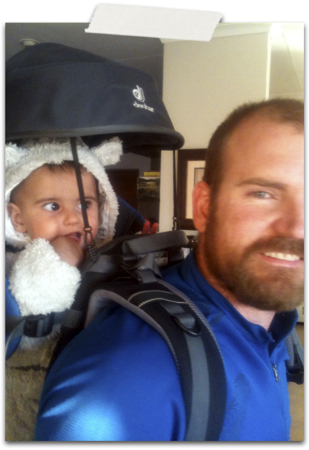
This is what Karen has to say about Kevin:
We met over breakfast a few years ago, when I was in Jo’burg co-training with Peter Hundermark. The breakfast was at a training venue with dreadful food. Fortunately the relationship survived the dodgy breakfast. Kevin is a great person to debate agile engineering practices with. His company: Driven Software is one of the few places I know that implement them well.
What is something people usually don’t know about you but has influenced you in who you are?
I didn’t grow up around computers or offices - my dad was an electrician and my mom a nursery school teacher. I only learned how to turn a computer on after leaving high school. We weren’t allowed to watch much TV at home and I never found school particularly engaging. I used to spend a lot of time at the local library, finding interesting things to learn about. I think it taught me the value of self-directed learning and how to teach myself how to do things. It also meant I was never deeply indoctrinated into the way things are ‘normally’ done.
What would have become of you, if you were not doing the job you do today?
Good question. I honestly don’t know. Become an anthropologist, perhaps.
What is your biggest challenge and why is it a good thing for you?
Understanding people. I’m a puzzle solver. I spent the first 15 years of my career understanding the puzzle of the computer. Now my journey is in understanding the puzzle of people and human systems. It’s a far more complex and challenging space. But more rewarding as well, I think.
What drives you?
My need to understand.
What is your biggest achievement?
I don’t think I’ve made it yet. I’m proudest of my family. Then the team at Driven Software and the successes we’ve had helping people, teams and organisations to grow.
Is there a piece of music that has a special meaning for you?
Gabriel’s Oboe comes to mind. That’s the music that was playing when my wife came into the reception at our wedding.
What is the last book you have read?
Started or finished (it’s a problem)? Last book I started was “The Art of Giving and Receiving Feedback” by Jerry Weinberg.
What question do you think we should also ask and what is the answer?
Can you give a good example of an endless loop?
Yes, see this question.
Whom do you think we should ask next in South Africa?
Any of the people from Driven Software or Danie Roux (one of our partners).
Whom do you think we should ask next, not in South Africa?
How would you define your relation to the South African Agile community?
It’s an interesting, but not especially useful container to put people in. Everyone has a different idea of what ‘Agile’ is, based on their own personal experiences. People talk about Big A Agile and small a agile and lean-agile and DAD and SAFe and on it goes. At the end of the day if you are someone who is trying to understand deeply what is going on around you, in your team and in your organisation then I’d be interested in exchanging ideas.
Johannesburg, April 2013
How to connect with Kevin
Twitter: @KevinTrethewey
Linked In: za.linkedin.com/in/kevint
Who is Rian van der Merwe?
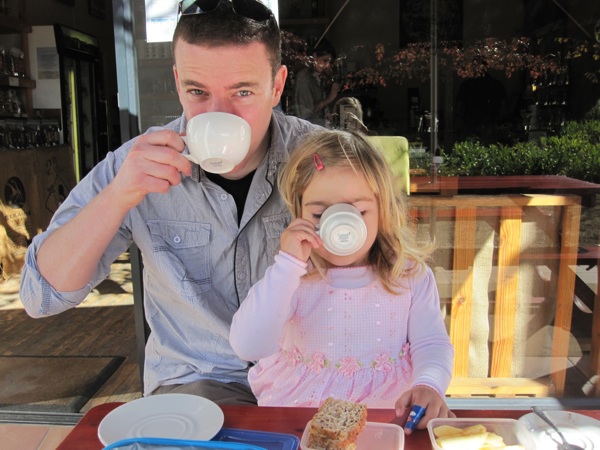
This is what Sam says about Rian:
Rian is an amazing guy to see talk. I first met him at a SPIN event where he was presenting. His humour and humbleness, aswell as his passion for all things design shone through. Speaking to Rian in person was a very different expereince - he is a shy, quiet guy but always his humbleness and passion shines.
What is something people usually don’t know about you but has influenced you in who you are?
I learned how to play guitar at a very early age, and it makes my job easier in ways I never imagined. The most valuable lesson guitar playing taught me is how to get beyond my extreme introversion and not be afraid of speaking in front of people. I didn’t realise how important this was until I fell into a career path that relies primarily on talking to (and understanding) people…
What would have become of you, if you were not doing the job you do today?
I think I would have landed somewhere between being an electronic engineer, an out-of-work musician, and a coffee shop owner. Or possibly some combination of all three.
What is your biggest challenge and why is it a good thing for you?
My biggest challenge is figuring out what to do with the limited time I have every day. I’m pretty sure we all feel like that. But it’s ultimately a good thing because it forces me to think very carefully about what I spend my time and attention on.
There are also certain non-negotiables in my life: if I’m not traveling for work, I want to be home for my daugthers’ bath- and bedtime routines. This forces me to take a real break at least once every day — there is no time to think about work and email during bath time! I find that very valuable, because I think we’ve all lost the ability to be bored. There’s always something to look at, an app with “pull to refresh” to keep us stimulated. But those breaks, where we don’t have much to do or think about… Those are the times when thoughts can settle and real breakthrough ideas can come. As Stephen Hacket once said: “Boredom isn’t a bad thing. But strangling it with Angry Birds probably is.”
What drives you?
I want to make things with meaning. I’m sure that sounds terribly cheesy — sorry about that. But I really want to work on projects and products that matter, that make people’s lives better, that improves the world in some way. Sorry for all the quotes, but I think Mike Monteiro said it better than anyone: “We used to design ways to get to the moon; now we design ways to never have to get out of bed. You have the power to change that.”
I really want to see good Design (in the broadest, problem-solving sense of the word) take over the world. I get disproportionately upset when I see bad design, but I’m working on that.
What is your biggest achievement?
Being reasonably successful at raising our two daughters. At least, I hope I am! That probably sounds like an “oh, he had to say that” answer. But being a parent really is the most challenging thing you can do with your life. It shines a light on all your insecurities, and it tears the selfishness out of you. There’s just no room for worrying about your lack of sleep or free time when you’re focused on helping someone become a human being — and their own human being at that, not some carbon copy of yourself.
I’m incredibly proud of my daughters, because in their confidence and sense of direction (which is often not the direction I would have gone!) I see that I did something right. If they feel loved without feeling smothered, I think that’s a win. So, yeah. I’m going to call that continuous learning experience my biggest achievement.
Is there a piece of music that has a special meaning for you?
Shew, that’s a tough one. We’re a music family, so it’s pretty impossible to pick just one. But I’ll pick an album that has some great memories for my wife and I. It’s Mutemath’s self-titled album. While we were living in San Francisco we went to see a band called Mae live at this total dive bar called Slim’s. But instead of freaking out about Mae, we were totally blown away by this new band called Mutemath. They were the first opening act, and they were unbelievable. We’ve been huge fans ever since, and have listened to and debated their songs for long hours.
What is the last book you have read?
Amusing Ourselves to Death by Niel Postman. It was written in the mid 80s, but it’s still extremely relevant today. It’s about the shift away from newspapers and the written word to television (or in our context, the Internet), and how that affects public discourse and what we spend our time on. It’s a fascinating read that really got me thinking. Highly recommended.
What question do you think we should also ask and what is the answer?
Do you like answering questions about yourself?
I find it really difficult.
Whom do you think we should ask next in South Africa?
Another tough question — there are so many people doing great work in the community. From a Product Management perspective I’m always interested in hearing Cliff Hazell and Peter Matthaei’s thoughts. Please convince them to write more!
Whom do you think we should ask next, not in South Africa?
Jeff Gothelf. He recently co-wrote a fantastic book called Lean UX, and his message of moving beyond deliverables fits in very well with Agile principles.
How would you define your relation to the South African Agile community?
I’m definitely a bit on the fringes, and should be more involved. It’s just difficult with two little ones at home. Like I said, I’m not a fan of missing bath time, and most events clash with that… But I do try to get out to an event at least once a month!
Cape Town, April 2013
How to connect with Rian
Twitter: @RianVDM
Linked In: za.linkedin.com/in/rianvdm
Who is Mike Freislich?
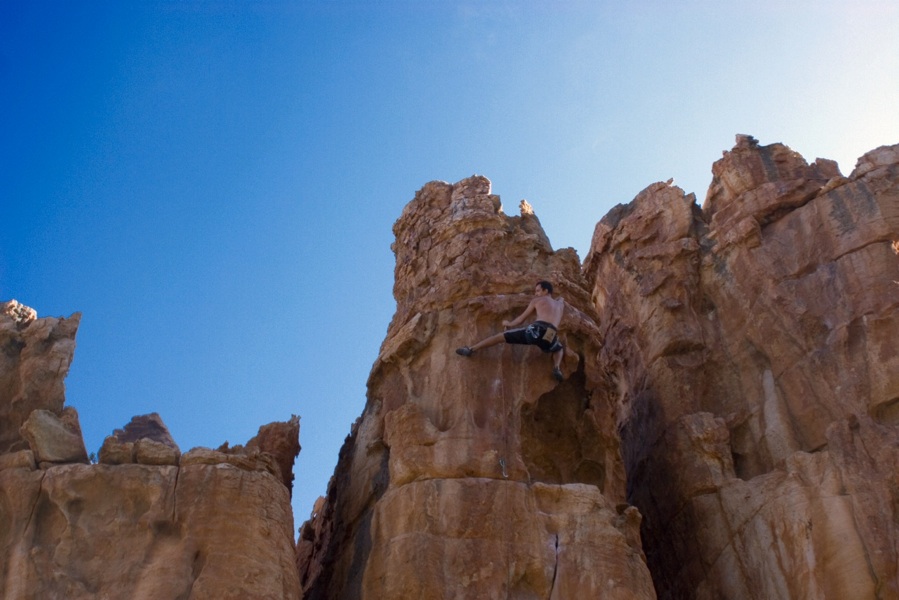
Here is what Karen has to say about Mike:
I first met Mike through the Scrum User Group. What I love about Mike is that he didn’t seem to be afraid of anything. He would tell a senior manager at a client exactly what he thought, and in a way that they would listen and respect what he was saying. I think that kind of courage and honesty is an asset in anyone, but particularly an agile coach.
What is something people usually don’t know about you but has influenced you in who you are?
“According to most studies, people’s number one fear is public speaking. Number two is death. Death is number two. Does that sound right? This means to the average person, if you go to a funeral, you’re better off in the casket than doing the eulogy.” - Jerry Seinfeld
I found myself at a crossroads a few years ago. I had hit a creativity ceiling at the organisation I was working with and wasn’t feeling inspired to grow further there; or perhaps I was simply feeling more than a little rebellious with a baby on the way, and my father diagnosed with cancer. Either way, I decided to quit my job of 10 years and look for something else to do (in that order). The first two opportunities that I was lucky enough to be presented with were both exciting. The first was getting back into a more hands-on technical role with people I knew well, who were working on a large-scale technology project in SA-education, and the other was to assist with kick-starting Agile in SA with a respected former colleague. My highly rational thought process at the time was to base my decision primarily on fear. In other words, whichever job scared me the most would be the one I’d go with. Since I share Jerry Seinfeld’s view (at least on the number one fear), the thought of standing in front of people and evangelising, training and coaching Scrum was indeed terrifying. So it is primarily due to my fear of public speaking that I pursued a role in Agile coaching. This decision has fundamentally changed how I look at the world, organisations, teams, relationships, problem solving and myself; I believe for the better :)
What would have become of you, if you were not doing the job you do today?
Hmmm… Difficult! When I’m surrounded by complexity, I often fondly consider the thought of selling ice-creams on the beach; in the rain. Or perhaps I’d still be writing rave-music, and have long-balding-hair. Paradoxical!
What is your biggest challenge and why is it a good thing for you?
Sustainable Pace! Possibly my biggest challenge over the last few years has been my work-life balance. Raising a young kid, and travelling every other week doesn’t leave much space for down-time. Because of this, I’ve spent some time reflecting on what’s important to me. Having been raised with an overburdened sense of responsibility, it’s difficult to say “no”. I think I find it easier to say “no” on behalf of others than for myself a.k.a. “protect the team”! In a creative work environment there is almost always more potential work than can be done. I found myself taking it too personally when I wasn’t able to keep up, or find some way in which to optimise things to allow for everything to get done. I’m starting to learn to go a little easier on myself. I’ve cut back on my travel (I suspect to the disappointment of my employer), and try to incorporate an art-of-the-possible mindset. It’s still a struggle, but it’s getting better - I think!
What drives you?
The knowledge that it’s a journey. The desire to do things that add value, stop doing things that don’t, and inspire others to do the same. That, and to have fun! Oh and… the look in my daughter’s eyes when she smiles.
What is your biggest achievement?
Health - 150 sit-ups & 27 pull-ups this morning :) Travel - Standing on the summit of Half-Dome, Yosemite, CA - A life long ambition finally realised! Family - My daughter is still alive and happy despite me Love - Louise said Yes! Professional - Having the courage to step away from the keyboard to coach Agile - only to start the next job and create a Gantt Chart?!
Is there a piece of music that has a special meaning for you?
Most recently, purely due to the powerfully emotive story-telling, I’d have to say Lucy Spraggan’s “Tea and Toast”. Being a hobbyist musician myself, I can also say that was extremely sentimentally attached to about 500 original compositions that died a horrible death, along with my hard drive … “cluck cluck”, but that’s a story for another time.
What is the last book you have read?
Narnia: The Voyage of the Dawn Treader - to my 5 year old daughter. To be honest, I’ve been reading surprisingly little recenty - perhaps it’s time to start so I’ll have a better answer when asked next time. I’m slowly meandering through the following books in multi-threaded fashion:
Start with Why - Simon Sinek (really speaks to me so far)
The Leader’s Guide to Radical Management - Stephen Denning
Logical Stupidity - Peter Greenwall
Hmmm.. looking at the list above, I see a lot of WIP and nothing DONE. Go Figure.
What question do you think we should also ask and what is the answer?
Does Agile get any easier the longer you do it?
Does life get easier the longer you live? Perhaps. Perhaps not. An understanding of the Agile fundamentals have become muscle-programming over time. Although, rather than making it easier for me, the nature of the questions on my mind have changed and perhaps gotten deeper. In some cases this has lead all the way to self-doubt and deviation from some fundamentals. Then, returning to the basics with renewed respect has been the inevitable outcome. It’s a journey. It’s still hard. Every cycle exposes something new.
Whom do you think we should ask next in South Africa?
Julius Malema? Agile and Politics aside, I’d pay to see his answer to some of these questions. Then again, perhaps I wouldn’t :)
Whom do you think we should ask next, not in South Africa?
Since this is a South African version of the book, I’m racking my brain for Agile South African’s, who are out of the country at the moment. Peter? Are you back yet? :) Perhaps Marius de Beer?
How would you define your relation to the South African Agile community?
To be quite honest, despite having been involved to some degree in it’s inception, I’ve been distant for a while. Work & Life - refer to Q3. The people I’ve had the privilege of meeting through the community over the years have always been inspiring, in their knowledge and their desire to work at improving things. It’s always good to know I’m not alone in chaos!
Cape Town, May 2013
How to connect with Mike
Twitter: @MikeFreislich
Linked In: za.linkedin.com/in/mikefreislich
Who is Mark Pearl?
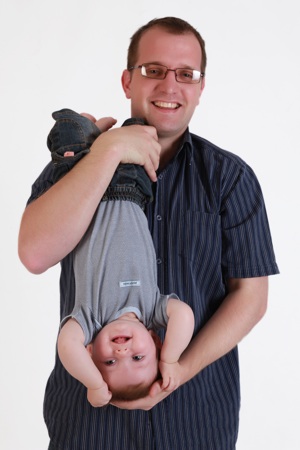
Mark was proposed by Cara and Kevin
This is what Kevin has to say about Mark:
I first met Mark Pearl when interviewing him for a position at Driven Software. Since then I have seen him grow from strength to strength and watched his knowledge and understanding of Agile grow and deepen to what it is today. When it comes to software development, Mark is one of those people who has been able to combine an understanding of process with that of technical implementation, meaning that he can help people to understand not only how to structure their flow of work but also coach the agile engineering principles and practices that are required to support it.
What is something people usually don’t know about you but has influenced you in who you are?
When I was growing up I wanted to be a professional basketball player. I was never good enough, but it got me into playing team sports. Learning to be part of a team in my youth has had an impact on how I view my interactions with work colleagues and software development as a whole.
What would have become of you, if you were not doing the job you do today?
I would have ended up in some sort of team based work environment. I wanted to be a botanist when I was a kid, although I don’t think I really understand what that was or is.
What is your biggest challenge and why is it a good thing for you?
The biggest challenge for me is to have balance. I like to focus in on one thing an explore it to its n’th degree, This is very useful in the IT world where there is a need to understand things in depth. Not so great when you are trying to stay in shape but forget to exercise because you are engrossed in a book.
What drives you?
Being better than what I was yesterday.
What is your biggest achievement?
My son and family.
Is there a piece of music that has a special meaning for you?
Shaggy : “Mr. Lover Lover” – This could potentially be a long story, but it has meaning to my youth. In matric it got me the lead role in the school musical of Joseph and the Amazing Technicolor Dreamcoat - who would have thought??
What is the last book you have read?
Domain Driven Design by Eric Evans
What question do you think we should also ask and what is the answer?
This one I have no clue on.
Whom do you think we should ask next in South Africa?
Janco Wolmarans – I think he will have some very insightful comments.
Whom do you think we should ask next, not in South Africa?
Since I am reading Eric Evans book right now, I nominate him.
How would you define your relation to the South African Agile community?
Growing contributor.
Johannesburg, June 2013
How to connect with Mark
Twitter: @MarkPearlCoZa
Linked In: za.linkedin.com/pub/mark-pearl/14/843/899
Who is Peter Hundermark?
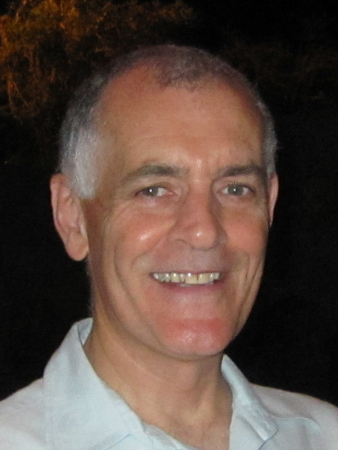
Here is what Karen has to say about Peter.
To me Peter is a bit like the father of Scrum in South Africa. He brought out Boris Gloger to teach the first Scrum courses, and then became the first Certified Scrum Trainer in South Africa. He has certainly had a huge influence on me becoming so involved in the agile community. I don’t think Who is agile in South Africa would be complete without him.
What is something people usually don’t know about you but has influenced you in who you are?
I studied production management in the late 1980’s, when JIT and kanban were just getting known, but before Lean even had the name. This stuff was in the back of my textbook labelled “new techniques”!
What would have become of you, if you were not doing the job you do today?
Where do old project managers go to die? Ganttville, perhaps?
What is your biggest challenge and why is it a good thing for you?
Being self-aware when I am with my clients. I need my Heart, Mirror, Gyroscope and many other tools. When I am able to harness these tools, I become a much better person.
What drives you?
Helping people to recapture joy at work, one person at a time. For me this is inextricably linked to modern leadership.
What is your biggest achievement?
Persuading my wife to marry me and helping her (slightly) in raising our two wonderful, grown-up daughters.
Is there a piece of music that has a special meaning for you?
Jaqueline du Pre playing the Elgar Cello Concerto. It is so full of emotion that evokes the highs and lows of her life.
What is the last book you have read?
Jerry Weinberg’s “More Secrets of Consulting”. He is a hero of mine.
What question do you think we should also ask and what is the answer?
For the last three years I have been engaged in finding ways to grow modern leadership skills at all levels in organisations, because I see this as the key missing ingredient. So what’s on my mind is how to become effective in this. And therefore a question I might ask is: “What defines modern leadership and how do we grow leaders?”
Whom do you think we should ask next in South Africa?
Whom do you think we should ask next, not in South Africa?
How would you define your relation to the South African Agile community?
I’ve had the privilege of being involved really from the beginning: helping to organise the first local Scrum training course, founding the Scrum User Group, etc. Nowadays it’s a thrill to see the third and fourth generation of community leaders emerging.
Cape Town, June 2013
How to connect with Peter
Twitter: @peterhundermark
Linked In: za.linkedin.com/in/peterhundermark
Who is Joanne Perold?
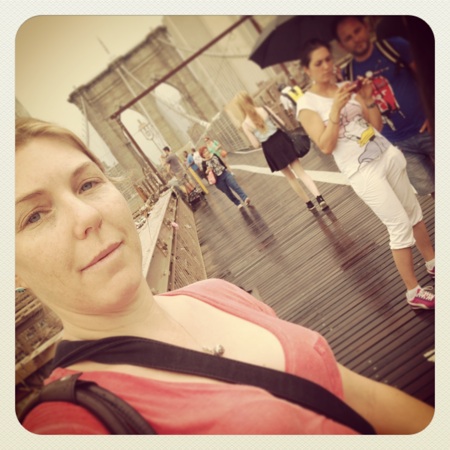
I met Joanne at the first Agile Breakfast in Jhb. I was immediatly blown away by her knowledge of conferences like AYE. I had never met someone in South Africa who knew what AYE was. Then I learned that not only did she know about AYE but had attended. Clearly I was meant to meet Joanne and share a journey with her, and secretly be jealous of her attendance of AYE and now PSL!
What is something people usually don’t know about you but has influenced you in who you are?
I practiced Systema (Russian martial arts) for 2 and a half years, I was fortunate to have a great instructor who taught me many things. I learned that I could push myself well beyond what I thought I was capable of and then further. One of the most valuable lessons was learning to breathe and relax when I start to panic. By learning to handle my panic and fear better, I am more effective in pressure situations. I have used these lessons fairly often in my work life as well. Breathe, don’t panic. Another valuable lesson was understanding that pushing yourself till your failure point is the point at which the real learning actually begins. Knowing where and how you will fail means that you can begin to adjust your strategies and grow past that point.
What would have become of you, if you were not doing the job you do today?
Growing up my dad wanted me to study viticulture, I like to think that if I hadn’t found my way to this I would be making wine somewhere.
What is your biggest challenge and why is it a good thing for you?
Becoming aware of when to be helpful and when to take a step back has been a challenge. Learning when to be helpful and when to take a step back because it is interfering with the group/team. I have just come back from PSL (Problem Solving Leadership) with Jerry Weinberg , Esther Derby and Johanna Rothman and this was a fundamental learning for me. Sometimes being helpful can really get in the way of what is best for a team and for another person. That and talking too much, while trying to be helpful, often keeping quiet is helpful too.
What drives you?
I love to watch people grow and teams get better and I love being part of that. I love helping a team grow beyond what they thought possible and seeing the individuals prosper and happy doing what they do. I want to do things that matter with people who care.
What is your biggest achievement?
This is a really difficult question. I’m not a parent (yet) which I think is one of life’s great achievements, but there are lots of things that I am proud of. Having the courage to move from what I knew to something different had a major impact on my life and my career and helped me to grow in ways I could never have imagined. Getting published in Better Software magazine was a big one as well. I think my favorite thing and my best moment was getting to have lunch with and spend the afternoon with Jerry Weinberg during the PSL training I recently attended, he has been a hero of mine for a long time. When you are around him it almost feels as though you absorb a tiny bit of his awesomeness.
Is there a piece of music that has a special meaning for you?
Well; there was the 80’s… Its going to sound crazy but Kenny Rodgers the gambler is one that sticks with me. Whenever I hear my imagination creates the whole story of this old timer on a train, and I see Paul Newman telling tales and drinking whiskey. Plus it has great advice for so many things
“You gotta know when to hold em,
know when to fold em,
know when to walk away,
know when to run!”
I have applied this many times.
What is the last book you have read?
More secrets of consulting and Are your lights on? by Jerry Weinberg and Magicians End by Ramond E Feist
What question do you think we should also ask and what is the answer?
Who is your favourite comic character/ super hero?
Neil Gaiman’s Sandman is mine, I have the whole series of graphic novels (I am that geeky) and I loved every second of them.
Whom do you think we should ask next in South Africa?
Berto Coetsee,Kevin Shine, Justin Doyle
Whom do you think we should ask next, not in South Africa?
How would you define your relation to the South African Agile community?
I think I am at the beginning of a wonderful journey. I am getting to know the community and how many wonderfully, talented people there are in it. It is fantastic to get together and discuss things and challenge and grow each others thinking as well as support and advise each other.
Johannesburg, September 2013
I love our South African community and it has so many aspects to it. That makes it wonderful and diverse and sometimes tricky to keep up with. I like to encourage and grow people and so I do what I can in a few different spaces to stay connected with people and to grow and sustain the formal groups that exist in the ZA community. For SUGSA and Kanban ZA I sponsor, talk and attend many of the things that they do. For ZaTech, I try to contribute what I can in the slack group and in other spaces. I also have a few of my own community projects. I do Scrum Training at Tshwane University of Technology (TUT) to help grow the next generation. I also help them organise a Hackathon, or have done for the past 2 years. 2020 has been a hard year for many and students were heavily impacted so we aren’t doing a hackathon this year. Then I mentor one or two people at a time, and I also give support to young speakers. Nothing gives me a bigger kick than seeing someone who was on CSM training doing their first conference talk. I look forward to many years as a contributor to all of the Agile communities in South Africa in all the ways that I can.
Johannesburg, October 2020
How to connect with Joanne
Twitter: @JoPerold
Linked In: za.linkedin.com/in/joanne-perold/6/608/809
Who is Martin Cronje?
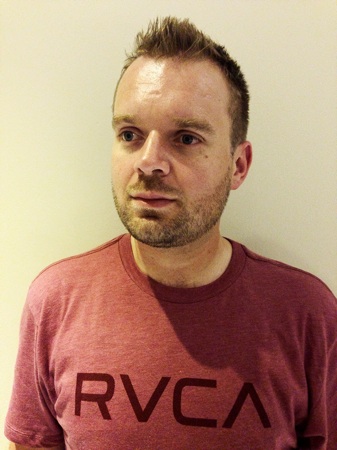
Martin was proposed by Mark Pearl.
Here is what Mark has to say about Martin:
I have known Martin for a few years now. My first real conversation with him was when I was preparing a workshop on BDD for a scrum gathering and Martin offered to explain the concepts to me over breakfast. Since then I have had in-depth conversations with Martin on a range of agile topics, from scrum and kanban to structuring code so that it lends itself to change. Martin has a depth and breadth of knowledge on agile concepts that makes him a worthy candidate for Who is Agile.
What is something people usually don’t know about you but has influenced you in who you are?
I grew up in a house with stories about Beethoven, Van Gogh and Steve Jobs. In many ways Steve Jobs was my dad’s icon. My parents were lecturers and two grandfathers were professors in sociology and chemical engineering.
Mom was an art teacher, artist and ran numerous art related business from running an arts school for kids to making clothes and teaching fashion. The net result is that I can mix paint, use a sewing machine and draw. My dad was a pharmacology lecturer and Mac enthusiast and hobbyist programmer. I grew learning to program in HyperCard on early versions of the Mac whilst also playing with Photoshop and Illustrator since version 1.0. My dad was also an active participant of the Mac user group during the late 80’s early 90’s.
When it came to school, I never really fit in. For some reason there seemed to be an implicit link between sports and academic performance. I ended up hanging with the rebellious crowd and getting into all sorts of trouble. Until to today I am a bit of a rebel and I guess that is why Agile also appealed to me when it all got started.
What would have become of you, if you were not doing the job you do today?
Since I left school there were many pivotal points that could have branch into endless outcomes. Thinking about it, I think there are three major points for me:
I discovered the Internet during the final year of high school and ended up spending most time running and maintaining websites most notably a popular MP3 site. I was working with people in Germany and ended up hacking away until the early morning hours, going to school and sleeping in the afternoons. I even missed one or two final exams because I got carried away on my computer. The net result was that my high school grades are not great.
Then in the early stages of my career I started becoming bored with the Graphic Design aspect and focused my energy on being a programmer. Finally in 2005 I turned down a promotion to manager position in one of the largest consulting companies worldwide which started me on the path of creating my own business.
I have not looked back - that much - since.
What is your biggest challenge and why is it a good thing for you?
Balance. For the first 12 years of working I dedicated all my energy to my career. In 2011, I experienced a low with one the worst experience of my professional career. That ended up being the catalyst to finally find a balance between work and life. Now whether it is work or fitness, I tend to push myself to the absolutely limit. At least there is balance now.
I lost a close friend in 2012, which inspired me to live life to the fullest. Do not ever wait for someday. Do everything you ever wanted to do now.
Programming gives me a lot of joy and it has been very challenging remain technical throughout my career. Company’s push their developers into non-technical or non-implementation career paths’ whether it is management or Enterprise Architecture. I had to give up on a lot of opportunities in my career to stay technical. Luckily the road less travelled is a lot more fulfilling.
What drives you?
I am deeply passionate about the things I care about especially building pragmatic beautiful systems on an aesthetic and technical level. My biggest competitor is myself and I always feel that I can do what I do better.
The one thing that fuels me most is when I cannot do something that others can, or when someone says something cannot be done.
What is your biggest achievement?
Professionally I am particular proud of three specific projects that I lead, designed and implemented; First the procurement system for National Treasury, it was one of the first .NET systems in the country and won an award, then there was the 2004 National Provincial Elections systems and also designing numerous systems for the JSE including their integration platform.
I realised that I was working too much and decided to change things. I started mountain biking and ended up losing 35 kilograms, quitting smoking and becoming fit for the first time in my life. All of this finally led to starting nReality where Jacques (my business partner and co-founder) and I have strong value on balancing work and life.
Last and by far not least was marrying my wife, Manisha Bhoola. She is amazing.
Is there a piece of music that has a special meaning for you?
I have many memorable songs linked to different significant events in my life ranging from specific songs by Trivium, Metallica, Black Sabbath, The Beatles and Led Zeppelin to Black Keyes, White Stripes and Muse.
Voodoo Chile by Jimi Hendrix is my favourite song of all time and almost always makes me feel good.
In many ways Nothing Else Matters by Metallica describes the relationship my wife and I share. Her family did not really approve of us initially. We played a cello version by Apocolyptica of the song when my wife walked down the aisle.
Classical pieces - especially Beethoven’s symphonies - bring me peace.
What is the last book you have read?
Last book: Lean Software Development: An Agile Toolkit - Mary and Tom Poppendieck
Most inspirational (recently): Founders at Work - Jessica Livingstone
Most insightful (recently): The tipping point - Malcolm Gladwell
What question do you think we should also ask and what is the answer?
What would you do if you did not need money? Build more systems, teach more and do less consulting.
What is your favourite past-time? Mountain Biking and Games (Computer and Console)
Whom do you think we should ask next in South Africa?
Chris Naidoo - He is one of the pioneers of Agile in South Africa through his work in the community especially the Agile forum (formerly XP forum).
Whom do you think we should ask next, not in South Africa?
How would you define your relation to the South African Agile community?
I am an active participant in the community really enjoy teaching people about how to build great systems using the best processes, practices and techniques for the job.
It is great being a part of a community and knowing that there are other people that care as much - or more - than me about the craft and software engineering as the sum of the parts.
Johannesburg, September 2013
How to connect with Martin
Twitter: @martincronje
Linked In: za.linkedin.com/in/mcronje
Who is Cliff Hazell?
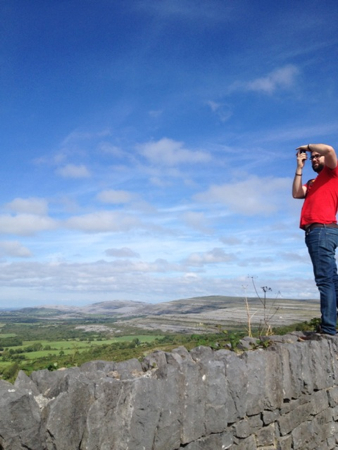
I really enjoying taking photographs, specifically interesting panoramic shots. Some of my favourites are of Baines Baobab in the Nxai Pan, Botswana and various views of and from Table Mountain. This photo is of me taking a panoramic photo over The Burren, Ireland, near the Cliffs of Moher.
Cliff was proposed by Cara and Rian.
Here is what Rian has to say about Cliff.
I first met Cliff when he grilled me on a Product Management talk I gave at a meetup. I’ve liked him ever since. Cliff doesn’t have time for nonsense, and he is not shy about communicating his strong and well-considered thoughts. That’s a great characteristic of a Product Manager. So, read on, and let’s learn from him!
What is something people usually don’t know about you but has influenced you in who you are?
I was a boy scout for most of my early childhood. Growing up in the bush or on the river taught me many things about freedom and about the value of time spent doing what you love. Experimenting around how to make the best fire, waterproof shelter and map work and topography taught valuable lessons about failure and resilience.
What would have become of you, if you were not doing the job you do today?
Architecture, most likely. Its always fascinated me, how permanent design choices are in this field, and therefore how important they are.
What is your biggest challenge and why is it a good thing for you?
I often ignore the softer side of relationships, this means for effective coaching and training I need to rely more on my team mates (and pairing) skills and strengths.
Which in turn leads to a far better result overall.
What drives you?
Exceptionally well designed systems and products.
I find this is achieved through continuous focus on Improvement.
What is your biggest achievement?
Creating and Heading up the Product Team at Web Africa, which successfully improved Customer Happiness ratings by 20% points.
Is there a piece of music that has a special meaning for you?
The piano arrangement of “The Robins Return”, remind me of my Grand father, and the many lessons he taught me about craftsmanship and taking pride in your endeavours.
What is the last book you have read?
Competing Against Time by George Stalk.
What question do you think we should also ask and what is the answer?
Whom do you think we should ask next in South Africa?
Whom do you think we should ask next, not in South Africa?
How would you define your relation to the South African Agile community?
Active and Curious. Would love to see more world class events locally, as well as more representation of local talent internationally. Specifically around moving from Agile being an “IT Thing” to being an Organisational journey.
Johannesburg, September 2013
How to connect with Cliff
Twitter: @ixhd
Linked In: za.linkedin.com/pub/cliff-hazell/0/289/517
Who is Kevin Shine?
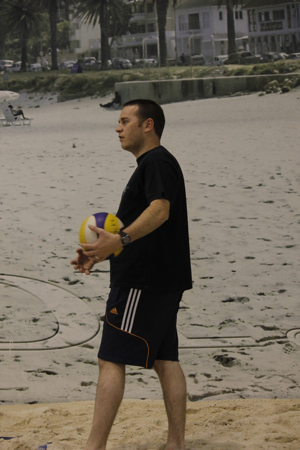
Here is what Karen has to say about Kevin. I met Kevin many years ago through the Scrum User Group. He was just getting started with Scrum at a grass roots level in his team at PruProtect. He had some challenges with management buy in. Fast forward several years and Scrum is now much more visible and talked about, not just at PruProtect but the whole Discovery group. Several teams are doing Scrum and there is a lot of organisational buy in. Kevin’s tenacity and staying power really impress me, definitely great attributes for a ScrumMaster!
What is something people usually don’t know about you but has influenced you in who you are?
I guess people may not know that I spent most of my career as a Java developer. I think this has influenced who I am today, because I saw many things that needed to be improved for developers to do their best work and I decided to be that change.
What would have become of you, if you were not doing the job you do today?
I would probably have ended up being a photographer. I love photography. I may still do that, who knows.
What is your biggest challenge and why is it a good thing for you?
Change management is my biggest challenge. Adopting agile isn’t simply about following a framework, there is so much to learn about why it works, how it works and also how to help people change. It sure has increased my reading list. Understanding change management and knowing how to best apply change is what I find my biggest challenge is currently. Its important to learn how to make change stick, agile books touch on this but the topic is huge. I enjoy a challenge because its an opportunity to learn and grow and maybe find out something new about yourself.
What drives you?
Seeing teams and people succeed, helping them deliver work that they are proud of that delights customers.
What is your biggest achievement?
I guess the fact that the company I am working at now(PruProtect) has moved to agile and has agreed that waterfall is definitely not the way to build software. Agile is now commonly accepted and people are learning and improving every day. Taking a company from waterfall to scrum is a big achievement, but I have to give the credit back to the people that made the change. I am proud of the work we have all done together. We have built an amazing company and its only getting better.
Is there a piece of music that has a special meaning for you?
Nope nothing I can think of off the top of my head. If I had to answer I would say “La Fway” by Beyoncé
What is the last book you have read?
Agile portfolio management - Jochen Krebs
What question do you think we should also ask and what is the answer?
As far as your agile journey goes, where do you see yourself in 2 years from now? Certified agile coach and/or Trainer.
Whom do you think we should ask next in South Africa?
Whom do you think we should ask next, not in South Africa?
How would you define your relation to the South African Agile community?
Committed, but I would love to do more. I try and help out as and when I can with SUGSA. Its not always easy to find time, but it is always fun. :-)
Johannesburg, October 2013
How to connect with Kevin
Twitter: @kev_shine
Linked In: za.linkedin.com/pub/kevin-shine/12/b33/7b4
Who is Justin Doyle?
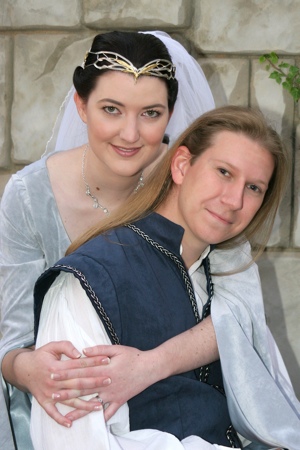
Justin was proposed by Joanne and Kevin
Here is what Joanne has to say about Justin: I have spent the last year working with Justin on the SUGSA_JHB committee. I enjoy his insights and he is passionate about Agile and about helping teams and people be better. I have really enjoyed working with Justin this year and learning together.
What is something people usually don’t know about you but has influenced you in who you are?
I enjoy roleplaying, you know, where you get a bunch of people into a room with some paper and pencils and a bunch of oddly shaped dice and form a party of heroic adventurers off on some desperate quest?!
Well it’s good fun to be had with a group of friends and I have played a number of systems and characters over the years, from sneaky thieves relying on their skills and agility to get past challenges in D&D, through to rogue FBI agents fighting to stave off the minions of Cthulhu for just one more day in Delta Green.
Roleplaying has allowed me to explore and experiment with parts of my personality and abilities that I maybe would not have been comfortable to do in real life. No more is this true than my experiences playing my favourite character of a bard. This charismatic, confident, jack-of-all trades persona seems to resonate with me and in many ways reflects both my career path and current role as Scrum Master, as well as a vision of what I would like to aspire towards in my life and career going forward.
What would have become of you, if you were not doing the job you do today?
Most likely I would have continued in some form of development or Development Manager type of role. That or I would have changed direction completely towards something like IO psychology… Which to be honest is something I am still strongly considering looking into as I feel there is a huge overlap and relevance to what I currently do.
What is your biggest challenge and why is it a good thing for you?
Strange as it may seem of a Scrum Master, but I have something of a phobia when it comes to writing on white boards and flip charts, which stems from a seeming inability to spell things correctly when writing in front of people combined with a rather scrappy hand writing.
Happily, I have chosen a career that almost constantly puts me in this situation so this is something I have had to confront and come to grips with. I have taken more than one failure bow during my time at the white board.
Although frustrating and embarrassing at times, I feel this has taught me a certain level of humility. Also, I think that this particular challenge acts in a way to show the teams I work with that we can be vulnerable and that failure is not the end of the world and rather is something that should be celebrated and learnt from so that we can build trust and constantly grow and improve.
What drives you?
Having a sense of purpose and feeling that I can make a difference are strong drivers for me. That is why I find working for a company like Discovery really motivating as everything you do has a direct impact on helping to make people healthier and protect and enhance their lives.
What is your biggest achievement?
To date I would like to think that the impact I have had and substantial progress Discovery has made on its journey to becoming a lean and agile organisation is one of my biggest achievements. This for me stands out because of the real difference Discovery makes in people’s lives, which I feel I am a part of, and helping to make even better.
Is there a piece of music that has a special meaning for you?
There are many pieces of music that stand out for me as they capture a particular sense of passion or emotion, however if I had to pick one it would be Adiemus by Karl Jenkins. Not only is this a truly beautiful piece with a rolling feeling of joy and passion, but it holds a very special meaning and memory for my wife and I, as we chose it in place of a traditional wedding march to accompany my wife as she entered the chapel and walked down the aisle.
What is the last book you have read?
Well I am currently coming to the end of my second read through of the Harry Potter series and the tension is mounting as we rush towards the inevitable confrontation between Harry and Lord Voldemort!
On a more agile track I am busy reading Disciplined Agile Delivery: A Practitioner’s Guide to Agile Software Delivery in the Enterprise by Scott Ambler and Mark Lines, which has been a very interesting read as I find the pragmatic approach it proposes to be of great help in organisations still busy with their transition to agile.
What question do you think we should also ask and what is the answer?
What is the air-speed velocity of an unladen swallow?!
On a serious note, perhaps a question around why we need something like agile? Why is it important?
This may seem obvious, but I think it is an important question as I have seen and heard of too many people who just follow the mechanics without understanding the underlying principles of agile.
In my opinion agile is a solution to the constantly changing, non-standard work environment we are faced with in things like product development. Agile allows for rapid innovation and experimentation and reduced concept to cash cycle times, which are critical competitive differentiators that organisations need to learn if they want to survive.
(and the correct response to the first question is to answer with a question - ‘An African or European swallow?’ - courtesy of Monty Python and the Holy Grail, and representative of the importance of always delving deeper to find the right answer)
Whom do you think we should ask next in South Africa?
My introduction and awakening to the concepts of Scrum and agile was during my time working at Kaizania, a company headed by Lionel Bisschoff. Lionel is a brilliant individual with a deep understanding of lean and agile and how it is not only changing the way we work, but also how we approach broader societal challenges.
I have learnt a great deal from Lionel and feel that he is a true thought leader in the agile community.
Whom do you think we should ask next, not in South Africa?
Although not strictly an agile practitioner, I would be most interested to learn more of Daniel Pink. I feel his work on motivation in books such as Drive: The Surprising Truth About What Motivates Us, resonate strongly with agile and it’s values and principals and I have found myself referring to his concepts around motivation - autonomy, mastery and purpose - on many an occasion.
How would you define your relation to the South African Agile community?
Actively involved! I am a committee member of the Johannesburg chapter of the Scrum User Group South Africa (SUGSA), an authorised user group of the Scrum Alliance. Together with my fellow committee members, I help to arrange monthly events with speakers on a wide range of Scrum and agile related topics. In addition, I try as far as possible to get involved and attend regular agile interest groups such as Agile Breakfast and Lean Coffee meet-ups, and also run an internal Scrum user group at Discovery.
Recently, I have also had a paper accepted for the Scrum Gathering in Cape Town, which will hopefully be the first of many such conference presentations going forward.
Johannesburg, October 2013
How to connect with Justin
Twitter: @doyle_justin
Linked In: za.linkedin.com/in/justinwdoyle
Who is Austin Fagan?
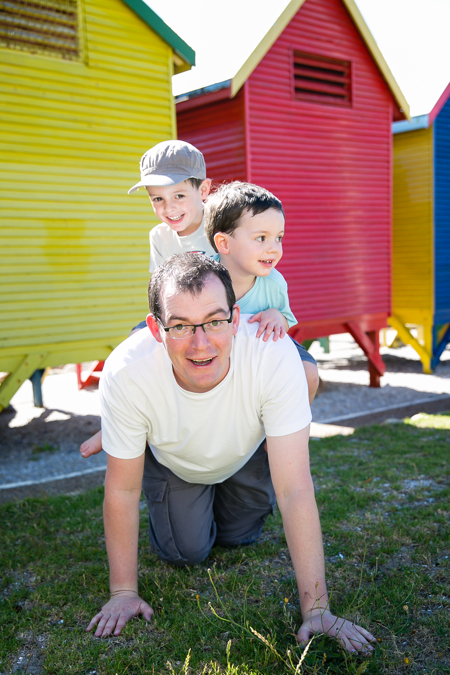
Austin was proposed by Carlo. Here is what Karen has to say about Austin.
Austin is a really funny guy. Plus he has that great Irish accent, a winning combination especially as a master of ceremonies for conferences. I always have a good time around him. I think his sense of humour has helped him and some of his teams through very trying circumstances. He is usually surrounded by a small whirlwind of chaos, and yet it doesn’t seem to fluster him at all. Must be something to do with being the father of many small children.
What is something people usually don’t know about you but has influenced you in who you are?
I spent a lot of my childhood wallowing in self-pity, which possibly started when it dawned on me that I didn’t have any super powers and I was unlikely to acquire any. Moving to a new town when I was eight didn’t help matters much either. At some point I decided I should celebrate the little victories. I still do this now; some would say I celebrate them way too enthusiastically! For me, in agile, you need to roll with the punches and jump for joy with every little win. I must admit though that sometimes I have a little wallow now and then it makes the highs that much more rewarding.
What would have become of you, if you were not doing the job you do today?
I’d have been a really bad actor or a fairly passable chef - food is a bit of a passion for me.
What is your biggest challenge and why is it a good thing for you?
Explaining things to my ever-inquisitive five-year-old son. I get a glimpse into how he is finding his way in this crazy world of ours.
What drives you?
Knowing there’s a high-five moment awaiting me just around the corner.
What is your biggest achievement?
I moved to London when I was 20. My childhood home in Ireland was next to a farm and other than a week in Scotland when I was 11, I had never been outside the country before.. So adapting to London and loving it for 12 years is my greatest achievement so far.
Is there a piece of music that has a special meaning for you?
Perfect Day by Lou Reed. It was the first track on the best mixtape I ever made, which was the soundtrack to many fun times.
What is the last book you have read?
Intimacy by Jean Paul Sartre. I like reading older books.
What question do you think we should also ask and what is the answer?
What did you want to be when you were growing up? I wanted to be a writer.
Whom do you think we should ask next in South Africa?
Whom do you think we should ask next, not in South Africa?
How would you define your relation to the South African Agile community?
I’ve made a lot of friends from within this community and learnt so much from all of them. We are very lucky to have such a passionate community and I love it when we come together, there’s always fun times and great conversations.
Cape Town, October 2014
How to connect with Austin
Twitter: @austin_fagan
Linked In: za.linkedin.com/pub/austin-fagan/7/513/ab8
Who is Dillon Weyer?
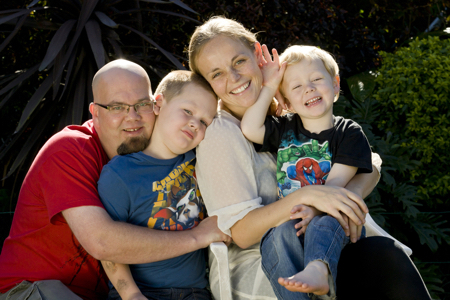
Dillon was asked to be part of the series since he presented at the South African Scrum Gathering in 2014.
Here is what Sam has to say about Dillon: I remember first meeting Dillon on a CSM course. He immediately struck me as someone with a great understanding of Scrum and in particular of the Scrum Master role. Since then I have seem Dillon grow as a coach.
I particularly enjoy his humble down to earth approach. He is not afraid to admit if he doesn’t know what to do, and is always willing to try something out. I appreciate his dedication to his own personal growth, and constant work to improve his relationships with others.
What is something people usually don’t know about you but has influenced you in who you are?
I think it is the fact that I lived in the UK for 12 years. It was in the UK that I was exposed to Agile, and because of that, when I returned to South Africa, I ended up in Johannesburg. If I never left SA, I would still be in East London, doing who knows what.
What would have become of you, if you were not doing the job you do today?
The road to how I have arrived at where I am now has been long with many twists and turns. Each one of these turns could have had me going in a different direction, so it is a challenging question to answer. I have had a very interesting and diverse career to date. I have been a beverage manager, PC technician, buyer, operations manager, project manager (the other type) and CTO. I often think back to how things might be different if I was still a buyer. I was a professional organist by the age of 9, so there is always that to fall back on. Hang on, does anyone play organ anymore?
What is your biggest challenge and why is it a good thing for you?
My biggest challenge is public speaking. It is good because I accept the challenge and it is something that I want to overcome this year. Watch this space for a SUGSA event near you for my debut.
What drives you?
How can I be better so that I can have a positive influence on all those around me, especially my two amazing boys?
What is your biggest achievement?
Arguably the credit goes to my wife, but delivering my second son at home has to be up there. Watching my two boys grow up and being able to influence them to become such amazing people is another. And finally, there’s the day I convinced the most wonderful, beautiful woman in the world to marry me. Ok that was three, what can I say I am an overachiever.
Is there a piece of music that has a special meaning for you?
Music plays a big part of my life, and I have a special track for so many different occasions. What I love is seeing how my two sons are developing their own taste in music, and how I am influencing it.
What is the last book you have read?
Sticky Wisdom by Dave Allan. Karen and Sam recommended this book in one of the newsletters a while back. After attending Paul Goddard’s presentation entitled: “Can laughing at our problems actually help us solve them?”, I have been on a quest on finding new ideas to help people solve problems in a new and inventive way. That is exactly what this book is about.
What question do you think we should also ask and what is the answer?
What is your goal for the next 2 years?
I have spent this last year focussing on improving as a coach. Not specifically Agile related, rather just developing my skills as an actual coach. I want to focus less on the process and more on systems and people. I have found that there is so much that Agile has to offer to so many other areas, not only in business but other areas as well. I am very keen on working with teachers to develop new ways to teach children HOW to learn, rather than just WHAT to learn. How can the children become more self-organised? How can we help them manage their work better? How can we help them solve their own problems? Sound familiar ☺.
Whom do you think we should ask next in South Africa?
Angie Doyle. I have worked with Angie for over 2 years now. When I met Angie, she was working as a BPA in a team newly introduced to Scrum. From day one Angie took to Agile like a duck to water. Angie is one of the best POs I have worked with.
Whom do you think we should ask next, not in South Africa?
Based on the fact that Paul inspired me with his presentation at the Scrum Gathering last year, I would suggest Paul Goddard.
How would you define your relation to the South African Agile community?
I feel like an adopted son. Living in the UK for 12 years and only coming back 2 years ago, I was very new to the Agile Community. The community invited me in with open arms and I am happily trying to repay the hospitality.
Johannesburg, November 2014
How to connect with Dillon
Twitter: @dmweyer
Linked In: www.linkedin.com/in/dillonweyer
Who is Pavel Dabrytski?
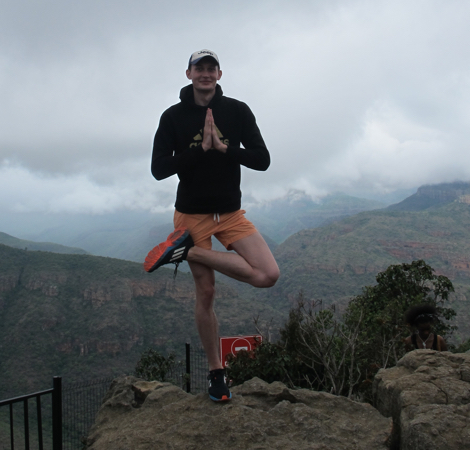
This is what Cara has to say about Pavel.
Pavel has been a passionate contributor to the agile community for the last few years. The only agilist in ZA who can coach in Russian, you’ll find him promoting LeanCoffee, free hugs and vodka shots!
What is something people usually don’t know about you but has influenced you in who you are?
Whilst people often guess that I am not from South Africa, not many of them know where I am from. I was born in a country called Belarus, located in Eastern Europe. Even though the country is bordering Russia, it is an independent state with its own language, economy and culture.
This particular culture has formed my personality. Over the past few years of living in South Africa, I have had to adjust my behaviour in order to bridge the cultural gap. Here is an example. Imagine that you went to the shop to buy some milk and you are standing at the till in front of a shop attendant. If you are in Belarus, you would just say “Give me milk”! Compared to South Africa where you will say something like “Excuse me! I am really sorry to bother you! Could I please have a carton of milk? Thank you very much! Hope you have an absolutely lovely day! Really sorry for the inconvenience I caused!”
I am exaggerating, of course, however, my straightforwardness (along with many other things) comes with my cultural background.
What would have become of you, if you were not doing the job you do today?
I am absolutely happy the way I shaped up over these years and I am enjoying the complex journey I am on.
One profession I would probably swap it for, would be a surgeon. I believe being a surgeon is one of the most complex, respected and demanding jobs in the current world. Would I be good at it? Hell, I don’t know.
What is your biggest challenge and why is it a good thing for you?
My biggest challenge is that I get bored quickly. I can’t do repetitive jobs. I am bored and depressed if I am required to the similar activities on regular basis. I rarely re-play computer games, re-watch movies or re-read books.
This has been a good thing for me as it has helped my personal growth and forced me to constantly look for new things.
What drives you?
Curiosity! I am constantly wondering what waits for me around the corner: new people, new adventures, new opportunities.
It is hard for me to stay in one place or do the same things for too long. I left home to work in another country at the age of 21. I have never regretted that.
What is your biggest achievement?
I hope it is still to come.
In 2014, I believe my biggest achievement was to train 33 Scrum classes, with over 550 delegates in total. While the first ones are always hard and one can never get them perfect, I believe I am getting better at training other people. Now I try focusing on inspiring and motivating people to carry out the changes, rather than just teaching them concepts, techniques or tools.
Is there a piece of music that has a special meaning for you?
There is no particular song in mind.
When I find a song I really like, I listen to it all the time for a couple of weeks until I get over it. The songs build associations to specific time periods in my life. Sometimes when I find an old song I used to like, it brings back memories.
Black Eyed Peas ‘Monkey Business’ was my 4th year university, Lady Gaga ‘Poker Face’ is from the time I first came to South Africa and I listed to Lana Del Rey while running on the beach in Cape Town.
I believe one day I will build a playlist which will help me to relive my life.
What is the last book you have read?
The last book I read was from the Maze Runner series. I originally went to watch the movie and realised it was the first in a trilogy. I couldn’t wait for a couple of years for the next movies to be released – so I read the books.
An Agile book I recently purchased and which is on my list to read is ‘Fifty Quick Ideas To Improve Your User Stories’ by Gojko Adzic, David Evans and Nikola Korac.
What question do you think we should also ask and what is the answer?
One interesting question to ask is “what was your first impression of Agile?”
I remember the time I had the first conversation about Scrum framework. I could immediately think of tens of ways people can trick or cheat the method. In my mind it couldn’t possibly work more effectively than the old controlled way. I couldn’t be more wrong :)
Whom do you think we should ask next in South Africa?
Biase De Gregorio and Angie Doyle. We worked closely for the past year and I have tremendous respect for their efforts to make our big banks a bit more Agile.
Whom do you think we should ask next, not in South Africa?
Adam Weisbart. I am continuously impressed with Adam’s energy and his ability to generate new ideas all the time.
How would you define your relation to the South African Agile community?
I have been part of the community since 2011, first in Cape Town and now in Johannesburg. Many of the community members have become really good friends. The amount of wine I’ve drank with them can be counted in barrels!
Johannesburg, December 2014
How to connect with Pavel
Twitter: @@PavelDabrytski
Linked In: za.linkedin.com/in/paveldabrytski
Who is Biase De Gregorio?
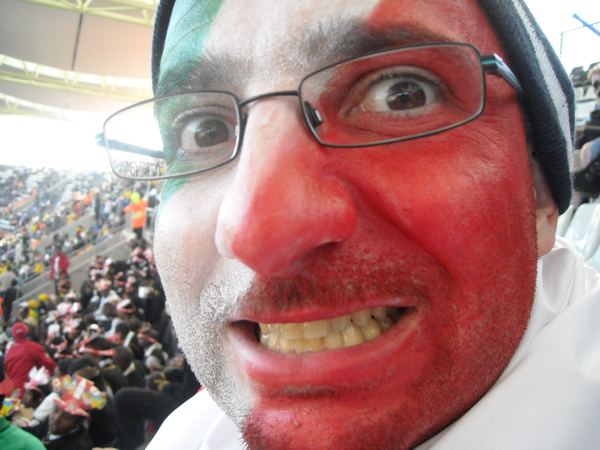
This is what Pavel has to say about Biase.
I first met Biase whilst trying to sell a sponsorship package for the Scrum Gathering conference in 2013. This somehow led to us working together. Biase is really good at mentoring others. He has facilitated numerous Scrum classes, and trained over a 1000 people in South Africa. I admire Biase’s ability to always stay positive and never get angry.
What is something people usually don’t know about you but has influenced you in who you are?
I was the youngest in my direct and indirect family by at least 7 years and as a result didn’t have a usual upbringing and was always more mature than my friends and colleagues of similar age.
What would have become of you, if you were not doing the job you do today?
I would have loved to be a professional footballer and once my career was over get into sports in some form or the other.
What is your biggest challenge and why is it a good thing for you?
Being the only guy in my family (Wife, 2 daughters, mother-in-law and even my dog is a female), which has taught me patience in many ways :)
What drives you?
Passion and pride in everything that I try and do.
What is your biggest achievement?
From a personal perspective it has to be my 2 girls. They are my life and mean everything to me.
Is there a piece of music that has a special meaning for you?
Cosmic Girl from Jamiroquai – reminds me of a happy place during varsity days
What is the last book you have read?
The latest Jeff Sutherland book - Scrum: The Art of Doing Twice the Work in Half the Time
What question do you think we should also ask and what is the answer?
Q. Why did you get into Agile? A. I am a recovering project manager and based on my project management style of collaboration, relationship building and focus on delivery, Agile is very much aligned to my own values and style. It just makes sense.
Whom do you think we should ask next in South Africa?
Whom do you think we should ask next, not in South Africa?
Don’t really have anyone - sorry
How would you define your relation to the South African Agile community?
I’d like to think that I am respected by my peers and my colleagues inside and outside of my organisation. I am truly proud of what I have been able to achieve with my team and the difference we have made. At times, it is highly frustrating as most people don’t share the same passion and just don’t get it…But we keep on persisting and changing one individual or team at a time.
Johannesburg, January 2015
As a frequent sponsor of the Agile community events and conferences, we believe that this is the foundation in growing the community outside of the practitioners. This is not about promoting your own organisation, but rather about learning and sharing knowledge and experience to ensure that agility is promoted throughout the country. We have 28 Agile consultants in my team at the moment where we help organisations adopt Agile ways of working through coaching and training and we want to continue driving making organisations safe for employees again.
Johannesburg, November 2020
How to connect with Biase
Twitter: @handle
Linked In: za.linkedin.com/pub/biase-de-gregorio/b/b08/b3a
Who is Regina Martins?
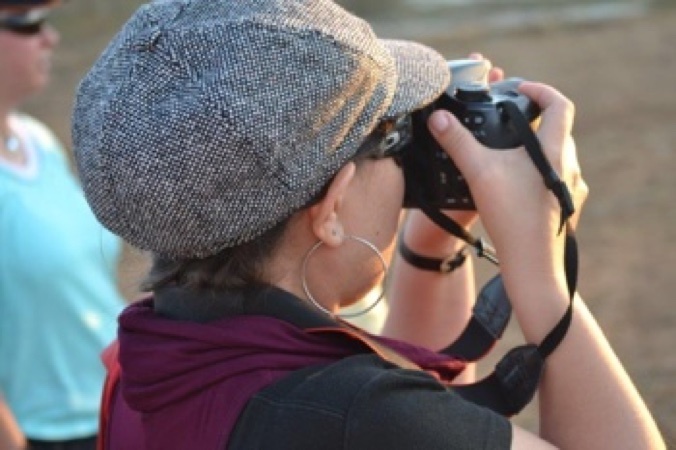
Regina Martins was proposed as she presented at the South African Scrum Gathering in 2014.
What is something people usually don’t know about you but has influenced you in who you are?
I grew up in Mozambique for the first 9 years of my life and with the political instability breaking out prior to independence from Portugal in the 1970 my folks decided to emigrate to South Africa. At that time, like most kids in my situation I spoke not a word of English! I was put in a separate class called a “language clinic” and within 3 months had learnt enough English and Afrikaans to join the mainstream classes. Despite that I was put back 2 years from the level I was at in Mozambique. My folks spent a lot of time speaking with the school and education department to get me to a standard where I was actually learning something new, to no avail. I didn’t realise how this affected me until my 30s. When I fight tooth and nail not to be placed in a box; when people tell me I can’t do something I will take that as a challenge; and last but not least, I have little tolerance for people who follow rules blindly.
What would have become of you, if you were not doing the job you do today?
If I’d been a diligent university student I would have become a teacher! Since I enjoyed ‘varsity social life too much I went into IT. Seriously though, I did the first 2 years of my degree before realising that I had no idea what I was going to do with it. Teaching, by that stage, was not an option. So I left ‘varsity, went to work for a bank, and returned a decade later and finished my degree. I managed a full time job, a home and a marriage and my results were still better than when I was footloose and fancy-free. There’s something to be said for maturity, desire and focus.
What is your biggest challenge and why is it a good thing for you?
I wish I could hypnotise everyone into loving Agile. I have to keep reminding myself to take people on the journey. And that it is ok for them to opt-out…(I’m still working very hard on this one). This keeps me grounded and looking for new ways, new thinking, to make me a better coach.
What drives you?
Continuously learning and improving so that I can be a better version of myself tomorrow than I was today.
What is your biggest achievement?
I’ve had many achievements and it’s not easy to choose only one. To have been part of the Agile journey of “Team Mauritius” rates quite high on the list! What they have achieved and delivered in the last 5 years is astounding! With the Product Owner and business a 4-hour plane ride away! Without any virtual boards! Instant messaging, the telephone, great relationships, the occasional visit to paradise and heaps of TRUST!
Is there a piece of music that has a special meaning for you?
I walked down the aisle to Procol Harum’s “Whiter Shade of Pale”. Not exactly a wedding song, but it’s such a beautiful melody and infinitely better than the wedding march, for me at least.
What is the last book you have read?
Catching the Big Fish by David Lynch : Meditation, Consciousness, and Creativity. I’m a fan of David Lynch’s work and I found out sometime ago that he is also a Transcendental Meditator. Ideas are like fish and to catch a really big one you have to go deeper. Transcendental Meditation is a way to go deeper. I’ve experienced this - when I meditate regularly creativity just flows.
What question do you think we should also ask and what is the answer?
What is your favourite mixed metaphor (I love mixed metaphors and the cultural and linguistic nuances that come with them)? It’s time to take the bull by the tail and look him in the eyes… Can you picture that? I can, but I certainly don’t want to be the one doing it.
Whom do you think we should ask next in South Africa?
Rahul Sharma. He wears his Agile heart on his sleeve and he’s a great Test Analyst. He was exposed to Agile around 4 years ago and it’s changed his career focus. He achieved his CSM and CSP and is on the Joburg SUGSA committee. His passion for Agile is evident in his interactions. He’s played an influential role in sharing his experiences with testing in an Agile team to the greater testing community in a Joburg based bank.
Whom do you think we should ask next, not in South Africa?
Kent Beck. I attended his closing keynote at Agile Africa 2015 and thoroughly enjoyed what he had to say about personal accountability at Facebook. I also enjoyed his speaking style, he’s so funny. Sam and Karen told me that he does stand up comedy and I found a video on You Tube. I’m curious to read his answers to these questions :-)
How would you define your relation to the South African Agile community?
Sitting quietly in the background watching, listening and learning as much as I can and occasionally stepping out to do a talk or two. I love connecting with everyone at the gatherings and each time I get to know more people. I also love seeing people really blossoming because they have chosen to follow the Agile path fully instead of just “dabbling”. This has meant that they’ve changed the companies they’ve worked at and found new environments. That takes real courage.
Johannesburg, September 2015
How to connect with Regina
Twitter: @gianamar
Linked In: https://za.linkedin.com/pub/regina-martins/17/21/8b5
Who is Jacques de Vos?
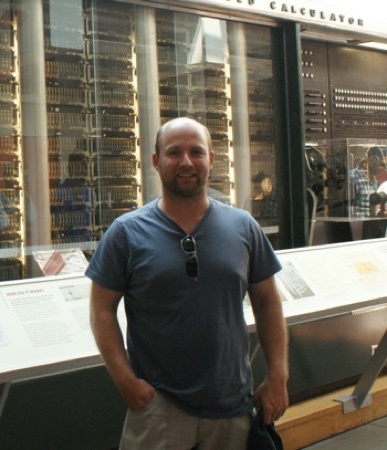
Jacques was proposed as he was a speaker at Agile Africa 2015.
What is something people usually don’t know about you but has influenced you in who you are?
I’ve been reading philosophy from an early age, which left me with a heathy dose of scepticism of knowledge. We know so little.
Also, traveling quite a bit gave me exposure to different ways of life - comes in pretty handy with the coaching now.
As a developer, I discovered the magic of code when I was about 15, quickly realising that software is limitless and started finding useful applications - my first app was to manage the school cricket stats. This started me on the journey to learn how to build software products that change the world, and Agile has been a big part of this journey.
What would have become of you, if you were not doing the job you do today?
A steel engineer - our family curse.
What is your biggest challenge and why is it a good thing for you?
To be more pro-active and energised with new opportunities; I’m better at finishing than starting now. E.g. my sales skills can improve (the benefit is obvious).
Also, keeping better contact with friends and old colleagues is a challenge - I realise it would not take too much time and community is really important.
What drives you?
The power of ideas, and how shared understanding can change our world.
“Nothing is more powerful than an idea whose time has come.” - Victor Hugo
I want to understand things at a deep level.
I want everyone to find their place in the sun and be happy - whatever that means to them.
What is your biggest achievement?
Building my house in Tofo Mozambique .
Did everything wrong: business with friends, borrowed money from family, invested in something I know nothing about, in a remote place with a different language and hardly any infrastructure, and more than I could afford as a 25 year old. Basically chased a pipe dream.
But a few years of “vasbyt” left me with happy friends, family and a beautiful house in paradise and life lessons. It was a epic journey of ups and downs.
Lesson: the best things are the things we would not do if we knew what it entailed - bias action, make mistakes, experience life.
Is there a piece of music that has a special meaning for you?
Nothing specific. A few alternative rock bands immediately bring back memories of good friendships and good times.
The Interstellar soundtrack (Hans Zimmer) was quite inspiring lately, didn’t know organ music can be so epic.
What is the last book you have read?
The Nature of Software Development, Ron Jeffries.
This nice, simple read that confirmed to me that the nature of software can and should be understood by businesses people that own software assets - I believe collaborating on software decisions is completely neglected in our industry.
What question do you think we should also ask and what is the answer?
Q: If Agile is the buzz word now, what comes after it - the next big thing? A: Agile is evolving and morphing into anything that works for orgs that do product development or other difficult stuff, so the learnings are here to stay until strong-AI or a zombie apocalypse. Although Agile practices will actually help us find a quick solution to deal with zombies at minimum cost (in lives, no big bang).
Whom do you think we should ask next in South Africa?
Rouan Wilsenach seems to be a rising star in Agile SA. Doing lots of interesting talks in all kinds of areas in Agile and software development, and engaging with the community. I think we can expect some good writing to come from him in the future as well (in addition to good code).
Whom do you think we should ask next, not in South Africa?
John Blakey and Ian Day - for Challenging Coaching.
How would you define your relation to the South African Agile community?
I was one of the earlier practitioners, but only recently became an active participant, a good citizen, in the community. I’m listening, talking, encouraging, challenging other people now, and making lots of friends. The feeling of being part of a small community of Agile coaches is tactile.
My niche in the community is being a generalist over the whole software development lifecycle, with a strong focus on product and software design as well as tech entrepreneurship.
Johannesburg, September 2015
I’m not actively participating in the community anymore and do very little coaching, although still a part of it.
Johannesburg, November 2020
How to connect with Jacques
Twitter: @jacdevos
Linked In: https://za.linkedin.com/in/jacdevos
Who is Mark Nilsen?
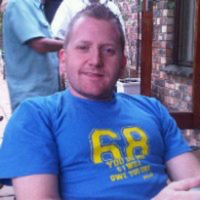
Mark Nilsen was proposed by Cara as he is a passionate agile advocate.
What is something people usually don’t know about you but has influenced you in who you are?
Between 1996 and 2004, I represented South Africa in three Paralympics, two World Championships and over 10 additional international events in two sporting codes; swimming and table tennis. The experiences I had and shared with others had a profoundly positive and long lasting influence on my life and on me as a person.
What would have become of you, if you were not doing the job you do today?
I would probably have either been a Cultural Anthropologist or a Doctor of Nutritional Biochemistry and Physiology. I find the psychology of humans and the behaviour and cultures of groups/tribes fascinating. Lately, I seem to have acquired a strong desire to learn more about nutrition and the biochemistry and physiology of metabolism and metabolic diseases.
What is your biggest challenge and why is it a good thing for you?
Both personally and professionally, I find time management a big challenge. There is so much that I still want to do and learn and I battle to balance my time adequately between my family life, work life, and my own personal time. In a way this is a good thing because it forces me to prioritise and give attention to the things that I value the most. I don’t always get it right, but I try.
What drives you?
In completely random and un-edited order; to learn more, to help people and teams improve and to achieve success (whatever that might be for them), to make a difference in peoples’ lives, to get better at certain things, to see people loving their work, to be healthy, to be a good father, to be a good husband.
What is your biggest achievement?
I would say my sporting achievements – especially given that the first 12-15 years of my life were very challenging physically. In particular I would say that winning the singles titles at the British Open Wheelchair Table Tennis Championships in 2000 and the African/Middle-East Championships in 2004 were highlights.
Is there a piece of music that has a special meaning for you?
Strangely enough I still like ‘Don’t Worry Be Happy’ by Bobby Mcferrin. I really believe that to a large extent being happy is a choice. And being happy is infectious. If we all worried less and were happy more, the world would be a better place. Otherwise, I like a variety of music; ranging from rock to pop and even some milder house music.
What is the last book you have read?
The last book I read was Leadership and Self Deception: Getting out of the box. My reading list is so huge the question is what book I read next!
What question do you think we should also ask and what is the answer?
I think you should also ask what question you shouldn’t ask and the answer is yes. :-) Sorry, that’s not very helpful, so let me try that again. You should ask what your guest believes are the most important changes that could help transform a knowledge or creative work industry like software development from one characterised by low engagement levels, to one of motivated people and successful businesses. I believe that at least one part of the answer lies in a critical re-examining of the assumptions we hold so dearly around human motivation and why people want to work. The majority of the management principles around today are antiquated. As Professor Gary Hamel put it:- “Right now, your company has 21st-century Internet-enabled business processes, mid-20th-century management processes, all built atop 19th-century management principles.”
Another part on the answer is enhancing our understanding of psychology, cultural anthropology and complexity theory. If we grow our toolbox in these ways, we might just begin to rescue people from todays’ widespread global workplace depression. As Einstein said: “We can’t solve problems by using the same kind of thinking we used when we created them.”
Whom do you think we should ask next in South Africa?
The people I’ve met most regularly over the years! Karen Greaves, Samantha Laing, Kevin Trethewey, Peter Hundermark, Cara Faye and Joanne Perold.
Whom do you think we should ask next, not in South Africa?
Henrik Kniberg, Dave Snowden, Esther Derby or David Anderson. All 4 are incredibly knowledgeable people – all in their own different ways.
How would you define your relation to the South African Agile community?
To be honest, it’s not as strong as it could, or probably should, be. I have met many great people over the years travelling to courses and conferences in and around South Africa, but, regular meet ups are difficult unless you live in Cape Town or Johannesburg.
Durban, August 2016
How to connect with Mark
Twitter: @MarkNilsenSA
Linked In: https://za.linkedin.com/in/mark-nilsen-a709391
Who is Antoinette Coetzee?
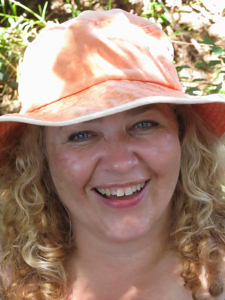
Antoinette Coetzee was proposed by Samantha Laing. Here is what Sam had to say about Antoinette: I first met Antoinette many years ago on a somewhat tragic project named after a cow. Antoinette was a Business Analyst and I was a Software Developer. The project was waterfall with nightmare deadlines and enough scrum/agile to make things worse. Its rather funny that we both ended up becoming agile coaches … maybe the cow had something to do with it.
What is something people usually don’t know about you but has influenced you in who you are?
I am a classically trained pianist and decided at the last moment to study Computer Science and not music. The rigour, practice, practice, practice and discipline has shaped my belief that it requires effort to become effortless and that there is always MORE to aim for.
What would have become of you, if you were not doing the job you do today?
I would either be an opera singer or a 4x4 bush guide!
What is your biggest challenge and why is it a good thing for you?
Probably to overcome the belief that nothing worthwhile comes easy. Refer answer number 1! It is good because I have a lot of drive and energy, but I would love to replace it with a belief system that incorporates some laziness!
What drives you?
The next new thought or deeper learning or realisation that makes a change to somebody’s life. I love opening minds and hearts.
What is your biggest achievement?
Nothing to do with work - either my vision quest in 2008, or the night I sang my first solo. I would love to say it was in the Met or La Scala, but it was to an audience of a full 15 people! And even that took some doing!
Is there a piece of music that has a special meaning for you?
Geez, that is hard… I listen to anything from hip hop straight through alternative, rock and jazz, all the way to classical. Perhaps Beethoven’s Moonlight Sonata and at the other end of the spectrum Sarah Mclachlan’s Ordinary Miracle. But that feels like being disloyal to soooo many composers, song writers and artists!
What is the last book you have read?
Robin Hobb’s “Forest Mage”
What question do you think we should also ask and what is the answer?
I think you need to ask me why I don’t write more. Because it is an important thing, but not urgent. And it takes a LOT of time!
Whom do you think we should ask next in South Africa?
Whom do you think we should ask next, not in South Africa?
How would you define your relation to the South African Agile community?
Hot and cold. I think there is a tremendous amount of talent, results and fascinating thinking and a fair amount of arrogance.
Cape Town, November 2016
How to connect with Antoinette
Twitter: @antoinetteCoet
Linked In: https://za.linkedin.com/in/antoinettecoetzee
How we connect
The agile community is alive an well in South Africa. If you’d like to get to know some of the people in this book personally, or others like them here are some of the communities you can join.
SUGSA
The Scrum User Group of South Africa - better know as SUGSA is an officially sanctioned Scrum Alliance User Group. It’s a non-profit group run by a group of enthusiastic volunteers. There are chapters in Cape Town and Johannesburg. SUGSA host regular monthly events with speakers on a range of agile topics, not just limited to Scrum. Events are free for anyone to attend. If you’d like to attend sign up to the mailing list on their website to be notified of the next event.
Besides monthly events, SUGSA also host other events like an annual Scrum Gathering, a full 2 day international level conference with talks by industry experts. SUGSA also host an Agile Coach Retreat each year which is a small unconference held over a weekend somewhere remote with alot of wine :)
SPIN
The Software Process Improvement Network - also known as SPIN is a group that meets monthly in Cape Town. Topic range is a bit broader than SUGSA, and generally have a more technical slant. Once again events are free for anyone to attend, and you can signup to the mailing list on their website.
Agile Breakfast
If you are looking for something less formal, Agile Breakfast is a group of people who meet every couple of months for breakfast. It’s a casual atmosphere to talk about anything with like minded agile people. It’s a great place to network and get to know people a bit better. It’s open to anyone, but it’s a pay your own way deal. So you pay for whatever you order. The groups meet at different restaurants, and operate in Johannesburg, Cape Town and Durban. To find out more about this join the Linked In Group for your area.
Lean Coffee
Lean Coffee was started in Seattle and has been replicated in many other cities, including Cape Town and Johannesburg. The groups meet regularly at a coffeee shop on a weekday morning. Everyone writes down topics they would like to discuss and then vote. The meeting is run via a visual board of topics to be discussed, currently being discussed, and done. Check out the websites for Cape Town and Johannesburg if you’d like to find out more.
RailsBridge
RailsBridge is an organization that works to increase diversity in tech by putting on a variety of awesome free events. They host free workshops for women new to coding to leave Ruby on Rails. There is a local chapter that runs workshops in Cape Town.
CodeRetreats
Coderetreats are free day-long, intensive practice events that focus on the fundamentals of software development and design. All ranges of skill and experience are welcome - it isn’t just for the gurus - anyone who has an interest in writing code will be able to contribute and come away with a deeper level of understanding. Register for upcoming events and find out more here: South African CodeRetreats.
JCSE Agile Forum
The Joburg Centre for Software Engineering (JCSE) is a three way partnership between government, academia and industry, based at Wits University. Their Agile Forum is run every 2 months on the evening of the third Monday of the month. They are ‘non-denominational’ in that they don’t focus on any specific ‘flavour’ of Agile, but welcome speakers and topics on any aspect of Agile (and Lean). Each session is 2 hours long, usually with a single speaker speaking for about an hour and a half, and with a lot of networking before and after. Topics are a good mix of theory, case studies, war stories and pragmatic practices.
Durban Agile User Group
The Durban Agile User Group meet regularly and host speakers on a variety of agile topics in the evenings. Join the Linked In to hear about events.
Developer User Group
The Developer User Group is a group of software developers who meet monthly to discuss topics of interest to general software development. From technology frameworks to agile methodologies, we cover pretty much anything. Currently we meet on the second Tuesday afternoon/evening of every month in Bryanston. Each session is about two hours and takes a presentation or workshop style format. If you would like to see upcoming topics join the group at www.DeveloperUG.org.za - all are welcome.
Who is agile series
If you liked this book be sure to check out some of the others in this series.
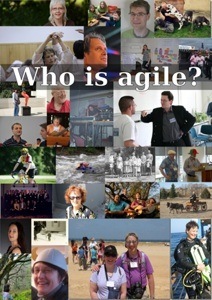
Who is agile: Volume 1 is the first book that started the series.
This first book has been translated into many languages:
Deutsch
Español
Catalan; Valencian
français
Русский язык
român
Then the series was scaled out by region:
Who is agile South Africa
Who is agile Iran
Who is agile Israel
Who is agile Australia and New Zealand
What are we reading?
This library is a list of all the books mentioned in the answers of the people.
A
- Adzic, Gojko & Evans, Dave: Fifty Quick Ideas To Improve Your User Stories
- Allen, David: Sticky Wisdom
- Ambler, Scott: Disciplined Agile Delivery
- Arbinger Institute: Leadership and Self Deception: Getting out of the box
- Asimov, Isaac: The Gods Themselves
B
D
- Dahl, Roald: Danny, Champion of the World
- Dashner, James: The Maze Runner Complete Collection
- Denning, Stephen: The Leader’s Guide to Radical Management
E
F
H
G
- Gladwell, Malcolm: The tipping point
- Greenwall, Peter: Logical Stupidity
- Grisham, John: The Litigators
J
K
- Kawasaki, Guy: Enchantment
- Kloos, Marko: Terms of Enlistment
- Krebs, Jochen: Agile portfolio management
L
- Lewis, C.S: Narnia: The Voyage of the Dawn Treader
- Livingstone, Jessica: Founders at Work
- Lynch,David: Catching the Big Fish
M
P
- Pink, Daniel: To Sell Is Human
- Poppendieck, Tom and Mary: Lean Software Development: An Agile Toolkit
- Postman, Niel: Amusing Ourselves to Death
R
S
- Sartre, Jaul Paul: Intimacy
- Sinek, Simon: Start with Why
- Stalk, George: Competing Against Time
- Sutherland, Jeff: The Art of Doing Twice the Work in Half the Time
W
- Weinberg, Gerald: Are your lights on?
- Weinberg, Gerald: The Art of Giving and Receiving Feedback
- Weinberg, Gerald: More Secrets of Consulting
- Womack, James & Jones, Daniel: Lean Thinking
How many times has this book been published?
- Version 1: June 12, 2013: 10 people. Minimum price 0.99
- Version 2: June 28, 2013: 12 people. How we connect added.
- Version 3: Sep 17, 2013: 14 people.
- Version 4: Sep 17, 2013: Intro added for Martin
- Version 5: Sep 19, 2013: 15 people.
- Version 6: Sep 19, 2013: Minor edits
- Version 7: Oct 10, 2013: Added ability to read online for free
- Version 8: Oct 21, 2013: Kevin Shine added. 16 people.
- Version 9: Nov 26, 2013: Justin Doyle added. 17 people.
- Version 10: Oct 18, 2014: Austin Fagan added. 18 people.
- Version 11: Nov 7, 2014: Dillon Weyer added. 19 people.
- Version 12: Jan 12, 2015: Pavel Dabrytski and Biase De Gregorio added. 21 people.
- Version 13: Sep 2, 2015: Regina Martins and Jacques de Vos added. 23 people.
- Version 14: Aug 12, 2016: Mark Nilsen added. 24 people
- Version 15: Nov 2, 2016: Antoinette Coetzee added. 25 people
